Written Samples
10 student council speech samples.
Running for a position on the Student Council is a commendable endeavor that requires courage, planning, and a clear vision. Student Council serves as the voice of the student body, advocating for changes, planning events, and representing student interests.
A strong, compelling speech can significantly impact your campaign, resonating with peers and motivating them to vote for you. This article provides 10 distinct student council speech samples tailored for various roles and personalities.

Student Council Speech Samples
Whether you’re running for president, vice president, treasurer, secretary, or a specific committee, these speeches are designed to inspire and guide you in crafting your unique message.
Speech 1: The Visionary Leader
“building a brighter future together”.
Fellow students, today marks a significant moment in our journey together. I stand before you, not as an individual, but as a representative of the collective dreams and aspirations we all share for our school. As a candidate for your Student Council President, I am committed to making those dreams a reality.
Our school is more than just a building; it’s a vibrant community where each of us has the opportunity to grow, learn, and succeed. However, like any community, we face our share of challenges. Whether it’s improving school lunches, increasing club funding, or ensuring that every student’s voice is heard, there is always work to be done.
My vision is to create a more inclusive, supportive, and dynamic school environment. This means establishing open forums where every student can voice their concerns, working closely with administration to implement sustainable changes, and building a culture of mutual respect and collaboration.
I bring to this position my experience as class representative, my passion for student involvement, and my unwavering commitment to our school’s welfare. Together, we can build a brighter future for all students. Let’s make it happen!
Speech 2: The Approachable Vice President
“uniting for a stronger community”.
Hello, fellow students! I am thrilled to stand before you as a candidate for Vice President of the Student Council. My goal is clear: to work alongside the president in creating a united, empowered student body ready to tackle the challenges and embrace the opportunities that come our way.
As Vice President, I will focus on enhancing communication between the council and you, the students. I plan to set up a suggestions box, hold regular meet-ups, and ensure your ideas and concerns don’t just stay heard but acted upon. I understand the importance of teamwork, and I promise to be an accessible, friendly face you can always turn to.
My dedication to our school community stems from my own experiences as an active member of several clubs and organizations. These experiences have taught me the value of listening, the importance of action, and the transformative power of community spirit. Let’s work together to make our school not just a place of learning, but a home of lasting memories and achievements!
Speech 3: The Meticulous Treasurer
“investing in our future”.
Good day, students! As a candidate for the position of Treasurer, I want to talk about an essential aspect of our student council: fiscal responsibility. The role of Treasurer is more than just handling funds; it’s about ensuring that every dollar you entrust to the council is spent wisely and benefits as many students as possible.
I come to you with a strong background in mathematics and a keen eye for detail, qualities that are crucial for managing our budget effectively. I plan to introduce transparent budget reports, seek your input on spending priorities, and negotiate for better deals on our events and supplies.
Investing in our future means more than just saving money; it means funding initiatives that build our skills, enhance our school spirit, and create lasting memories. With your trust, I promise to be a responsible steward of our resources, always seeking ways to improve our collective experience while maintaining fiscal prudence.
Speech 4: The Organized Secretary
“keeping us connected”.
Hello, everyone! As your prospective Student Council Secretary, I understand the significance of organization and clear communication in making our council effective. My mission is to keep us connected and informed, ensuring that every meeting, every event, and every decision is recorded and communicated to you promptly and clearly.
My approach involves not just meticulous note-taking and organizing but also harnessing technology to streamline our communication. This means regular updates through our school’s website and social media, creating a digital archive of minutes and decisions, and ensuring you’re always in the loop.
By keeping our council’s work transparent and accessible, I aim to build trust and encourage greater participation from all of you. Let’s work together to create a well-informed student body capable of making a difference!
Speech 5: The Dedicated Committee Member
“every voice matters”.
Hi, everyone! Running for a specific committee might seem like a small role, but it’s roles like these that make our student council function effectively. As a candidate for the [Insert Committee Name] committee, I am passionate about [Insert Committee Focus, e.g., environmental issues, school spirit, academic improvement].
My commitment is to bring fresh ideas, boundless energy, and a listening ear to this position. I want to ensure that every student who shares a passion for [Committee Focus] has a platform to express their ideas and see them come to life. Whether it’s organizing events, leading campaigns, or working on improvements, I am ready to dedicate my time and effort to make a real impact.
Your vote means not just support for me but an investment in the area we’re passionate about. Let’s join hands and make [Insert School Name] a beacon of [Committee Focus] excellence!
Speech 6: The Inspirational President
“leading with heart and vision”.
Dear students, as I stand before you, aspiring to be your next Student Council President, I am filled with a sense of purpose and determination. This school is not just an institution but a vibrant community where each of us has the potential to thrive and contribute. As your president, I aim to lead not just with decisions, but with vision, empathy, and unwavering dedication.
My vision for us is a school where every student feels valued and empowered. A place where we tackle challenges head-on, celebrate our diversity, and work collectively towards innovative solutions. I plan to initiate regular student-led forums, champion inclusive policies, and ensure that our activities and decisions reflect the rich tapestry of our student body.
My commitment to you is rooted in a deep belief in teamwork, respect, and perseverance. I have learned through various leadership roles that the key to effective leadership is listening, adapting, and inspiring. Together, we can elevate our school to new heights, create a nurturing environment, and build a legacy of positivity and progress.
Speech 7: The Dynamic Vice President
“collaboration and action”.
Greetings, fellow students! As candidates for Vice President of the Student Council, I am excited about the prospect of working closely with the president to amplify your voices and bring your ideas to fruition. I understand that this role is pivotal in facilitating smooth operations and fostering a spirit of unity and collaboration among us.
My focus will be on bridging the gap between students and the council, ensuring that we are not just a body making decisions but a dynamic team working in sync with the student community. I plan to introduce innovative collaboration tools and platforms where every suggestion is considered, and every voice is heard.
With my experience in organizing school events and managing teams, I bring a set of skills that are crucial for the effective execution of our shared goals. I promise to be proactive, resourceful, and most importantly, accessible to each one of you. Let’s work together to make our school a hub of vibrant student activity and shared success.
Speech 8: The Strategic Treasurer
“fiscal responsibility, our collective commitment”.
Hello to all! As your candidate for Treasurer, I am aware of the significant responsibility that comes with managing our student council’s finances. It’s not just about keeping books; it’s about strategic planning, transparency, and making every penny count towards improving our school life.
I bring to this position my experience with budgeting and finance, coupled with a deep commitment to serve each one of you. My plan includes introducing a participatory budgeting process where you get to have a say in our financial priorities, regular financial updates to keep everyone informed, and innovative fundraising ideas to boost our resources.
Investing in our collective future means making smart, ethical, and impactful financial decisions. With a keen eye on our goals and a strict adherence to transparency, I will ensure that our council’s financial health is robust and that our resources are aligned with our shared vision.
Speech 9: The Efficient Secretary
“the backbone of our council”.
Dear students, as a hopeful Secretary for our Student Council, I recognize the immense responsibility of being the link between you and the council’s activities. This role is more than just taking minutes; it’s about ensuring that every decision, every event, and every initiative is documented, communicated, and archived effectively.
My vision is to make our council’s workings as transparent and accessible as possible. This means not only meticulous record-keeping but also innovative communication strategies to keep everyone informed and engaged. I plan to utilize digital platforms to disseminate information, organize feedback sessions, and ensure that our council is always accountable to you.
With a commitment to organization and a passion for communication, I am ready to be the reliable backbone of our council, ensuring that as we move forward, every step is recorded, every voice is heard, and every achievement is shared.
Speech 10: The Passionate Committee Leader
“spearheading change, one initiative at a time”.
Greetings, peers! As a candidate for the [Insert Committee Name, e.g., Environmental Committee] leader, I am here not just to lead a committee but to ignite a movement. Whether it’s enhancing our school’s green initiatives, boosting academic resources, or strengthening our sports programs, each committee plays a crucial role in our student council’s mission.
I am passionate about [Committee Focus] and have spent my time at school actively involved in related projects and initiatives. As a leader, I plan to bring this passion to the forefront, driving innovative programs, rallying student support, and ensuring that our activities have a lasting impact.
Your support means empowering a dedicated leader focused on making tangible changes in our school. Together, we can champion causes close to our hearts, bring about meaningful change, and leave a legacy that future students will be proud of.
In crafting your speech, remember the importance of authenticity, clarity, and enthusiasm. Your fellow students are looking for leaders who not only promise but also inspire and enact real change. Use these samples as inspiration, but ensure your personal story and vision shine through. Good luck!

- PRO Courses Guides New Tech Help Pro Expert Videos About wikiHow Pro Upgrade Sign In
- EDIT Edit this Article
- EXPLORE Tech Help Pro About Us Random Article Quizzes Request a New Article Community Dashboard This Or That Game Popular Categories Arts and Entertainment Artwork Books Movies Computers and Electronics Computers Phone Skills Technology Hacks Health Men's Health Mental Health Women's Health Relationships Dating Love Relationship Issues Hobbies and Crafts Crafts Drawing Games Education & Communication Communication Skills Personal Development Studying Personal Care and Style Fashion Hair Care Personal Hygiene Youth Personal Care School Stuff Dating All Categories Arts and Entertainment Finance and Business Home and Garden Relationship Quizzes Cars & Other Vehicles Food and Entertaining Personal Care and Style Sports and Fitness Computers and Electronics Health Pets and Animals Travel Education & Communication Hobbies and Crafts Philosophy and Religion Work World Family Life Holidays and Traditions Relationships Youth
- Browse Articles
- Learn Something New
- Quizzes Hot
- This Or That Game
- Train Your Brain
- Explore More
- Support wikiHow
- About wikiHow
- Log in / Sign up
- Education and Communications
- Communication Skills
- Public Speaking
A Guide to Writing School Speeches: Structure, Delivery, & More
Last Updated: September 19, 2023 Fact Checked
- Brainstorming
- Writing & Structure
Sample Speeches
This article was written by Lynn Kirkham and by wikiHow staff writer, Finn Kobler . Lynn Kirkham is a Professional Public Speaker and Founder of Yes You Can Speak, a San Francisco Bay Area-based public speaking educational business empowering thousands of professionals to take command of whatever stage they've been given - from job interviews, boardroom talks to TEDx and large conference platforms. Lynn was chosen as the official TEDx Berkeley speaker coach for the last four years and has worked with executives at Google, Facebook, Intuit, Genentech, Intel, VMware, and others. There are 11 references cited in this article, which can be found at the bottom of the page. This article has been fact-checked, ensuring the accuracy of any cited facts and confirming the authority of its sources. This article has been viewed 1,077,613 times.
If you’re running for office in school elections, delivering your candidate speech can be one of the most important parts of the whole process. And you can’t deliver a good speech without writing a good speech. Sure, there are templates online that you can just paste in your name into, but a speech written by you, that represents you, holds a much better chance of making an impact on your classmates/voters. In this article, we’ll walk you through expert advice on crafting a speech that’s clear and concise, as well as some public speaking tips to help you resonate with your audience. The true power of your speech will come from how you personalize it, but consider this a comprehensive blueprint to help you get started. This article is based on an interview with our professional public speaker, Lynn Kirkham, founder of Yes You Can Speak. Check out the full interview here.
Things You Should Know
- Begin your speech by stating who you are, the position you’re running for, and a catchy slogan that reminds the audience what you’re working towards.
- Use the middle of your speech to explain your goals, if elected, and give a few specific steps on how you plan to achieve those goals.
- Keep your speech short and sweet; most school election speeches are only about 150-250 words.
Crafting Your Message

- For example, you might begin your brainstorming sesh with goals like “outlaw homework” and “allow skateboarding on campus.” Then, as you condense your ideas, you’ll become more realistic with plans like adding healthy food options at lunch, expanding a tutoring program, or working to reduce bullying.

- Your slogan can be lighthearted (“The Right Manuel for the Job”) or serious (“Your Voice for Change”).
- It can be focused on one specific issue (“Save the Spring Formal”) or aimed more broadly (“Let’s Fly Higher Together”). Most importantly, the slogan should make people think of you when they hear or see it, and give them an idea of how you’ll serve their interests.
- When writing a slogan , avoid negative language. You want to sound confident in yourself, rather than unconfident in your opponents.
- For example, if you’re trying to come up with a treasurer campaign slogan, you might say “A Vote for Maggie Makes Cents” or “Bank on Hank” rather than “Lyle Can’t Be Trusted With Money” or “Vote Hank, Not Celia.”

- A great way to show your qualifications and personalize your speech (without sounding like you’re blowing your own horn) is to tell a story. Talk about what made you want to run for office.
- For example, if you’re looking for FFA (Future Farmers of America) speech ideas, you might write “I’ve been working with animals since I was a kid and it taught me so much about life. I want to inspire other young people to do the same.”

- It can help to write down some key traits you possess and build your speech from there. For example, if you write “hardworking,” you could use your speech to talk about the countless hours of effort you plan to put into this job.
- If you write down “empathetic,” you can talk about how you understand people’s point-of-view and, if you’re elected, you’ll make sure everyone feels listened to.
- It can be difficult knowing how you come across. If you don’t know what your key traits are, ask your friends how they see you. They’ll be positive yet realistic.

- Avoid complicated sentences, jargon, or unnecessary asides. While your skill with language may work well in essays, now is the time to connect with an audience in words they can easily understand.
- As you draft your speech, read each sentence aloud after writing it. If it sounds awkward, clunky, or overly complex, revise it in simpler terms.
Structuring Your Speech

- Something simple like “Hi. I’m Jane Thomas, and I want to be your class president because I am dedicated to Making Butler High Better Together” is a highly effective way to begin.
- Try to tweak your introduction to match your personality. You could say “Some people say that Leon Lawson is too wild and not serious enough to be vice-president. Well, I’m Leon Lawson, and I say that I’m Seriously Wild about shaking things up in Key Club.”

- For instance, you might say “Bullying is an epidemic at Adams High School. Odds are that you have been bullied, seen someone being bullied, or even been a bully yourself. We can all do better.”
- Asking the audience can be a helpful tactic to connect over an issue. You might say “Raise your hand if you’ve been grossed out by the condition of our school bathrooms.”
- When stating the issue, avoid negative comments, or blaming a particular person or group. Instead of “Principal Stevens has done nothing to help with school lunches,” you might say “I hope to work with Principal Stevens to develop a plan so all our students are fed.”

- Be as precise as you can when explaining how you plan on accomplishing your mission. Instead of “I will unite the student body” (which is vague and unrealistic), you might say “I will create an open forum for students that meets every Friday at lunch so we can all share our ideas as a team.”
- Use active verbs to describe what you have done/will do. Some examples include: “pursue,” “follow,” “take up,” “initiate,” “present,” “represent,” “create,” “build,” and “lead.”
- If you’re running for re-election or have held a different office, talk about a few things you have done and a few you will do. Make it clear how they all link together. For example, you might say "As my work as President of Spanish Club shows, I can manage a team of people to achieve common goals. I will use this experience to pursue change in Student Government, too."

- To improve the ethos of your speech, find ways to connect yourself to the position you’re running for. Market yourself by listing your relevant experience and how you’ve prepared. For example, you might say “I’m secretary of 2 other clubs, so I can easily transition to secretary of Bible Club.”
- To improve the pathos of your speech, find moments to show off your personality. Are you goofy, fun-loving, sincere? Let that shine through in your language. You might add a joke or use some vivid adjectives.
- To improve the logos of your speech, make sure your goals are well-connected and realistic. Clearly explain why it’s reasonable for you to achieve each of your plans during your time in office.

- Even if you don’t have a short time limit, people rarely complain that speeches are too short. Don’t waste time on unreasonable promises or unnecessary details.

- For example: “We all know that there are too many cliques and factions that divide us as students here at West Branch High. This Friday, please consider voting for me, Ben Davis, for student council. I’ll make it my number one job to bring all West Branch Eagles together so we can Fly High as One.”

- For example, you might say “I have several additional ideas for ways to bring back Tiger pride to our school. I would love to hear your ideas too after class.”
Rehearsing Your Speech

- If you’re allowed to, practice giving your speech in the location where you’ll actually be presenting it. Get a feel for the room and the podium, so you’ll be that much more comfortable come speech day.

- If you can memorize your speech, great, but you don’t want it to sound like you’re just regurgitating words from a page. Know the speech by heart, so that you can seamlessly adjust to a misstated phrase or an unexpected opportunity to connect with the crowd.

- It can help to meditate before your speech and picture yourself getting a standing ovation (or whatever the best possible scenario is for you).
- Rely on whatever relaxation techniques work for you to get ready for your performance. If that means employing the old trick of imagining the audience naked, go for it — maybe just watch who you tell about having used it!
Delivering Your Speech

- Smiling throughout the entirety of your speech is an easy way to appear warm and confident without much effort.
- If you use hand gestures while you speak, be sure they’re not excessively distracting and keep your use of them limited. Appropriate hand gestures can help you engage your audience.

- You don’t necessarily have to make direct eye contact with any specific person. Just make it clear you’re trying to connect with your audience.

- If you make a mistake while giving your speech, don't panic. Laugh it off and move on. This will show that you are flexible and adaptable, and will encourage others to see you as someone who can meet challenges without losing her cool.

Community Q&A
- If you're very nervous before presenting the speech, try looking just above the heads of the audience or focus on a person that does not make you nervous, like a friend. Thanks Helpful 1 Not Helpful 0
- If you don't win, it's okay! Know you gave it your all and tried your hardest. There's tons of other opportunities to showing great leadership. Thanks Helpful 1 Not Helpful 0

You Might Also Like

- ↑ https://writingcenter.unc.edu/tips-and-tools/brainstorming/
- ↑ https://passport.vec.vic.gov.au/students/vote
- ↑ https://library.centre.edu/POL120Fall2019
- ↑ https://www.apa.org/monitor/2017/02/tips-speaking
- ↑ https://finley-h.schools.nsw.gov.au/content/dam/doe/sws/schools/f/finley-h/localcontent/how_to_write_a_speech.pdf
- ↑ https://www.comm.pitt.edu/structuring-speech
- ↑ https://writing.wisc.edu/handbook/process/reverseoutlines/
- ↑ https://www.lsu.edu/hss/english/files/university_writing_files/item35402.pdf
- ↑ https://pll.harvard.edu/course/rhetoric-art-persuasive-writing-and-public-speaking
- ↑ https://writingcenter.unc.edu/tips-and-tools/conclusions/
- ↑ https://hbr.org/2013/10/the-power-of-restraint-always-leave-them-wanting-more
About This Article

If you need to write a speech for school elections, think about what you would like to accomplish while you’re in office, then narrow that down to 1 or 2 goals. Next, come up with a catchy election slogan. Open your speech by introducing yourself and your message, giving a few details about why you’re the right person for the position. Include your slogan early in the speech, then identify your main goal and outline your clear, realistic plan for accomplishing those goals. End with a strong statement that tells the other students why they should vote for you. Keep reading for tips from our reviewer on delivering your election speech! Did this summary help you? Yes No
- Send fan mail to authors
Reader Success Stories
May 3, 2023
Did this article help you?

Tracy Gardana
Jul 5, 2021
Sapphire Etienne
May 3, 2018
Apr 14, 2019
Jul 23, 2016

Featured Articles

Trending Articles

Watch Articles

- Terms of Use
- Privacy Policy
- Do Not Sell or Share My Info
- Not Selling Info
Get all the best how-tos!
Sign up for wikiHow's weekly email newsletter

Choose Your Test
Sat / act prep online guides and tips, how to join your high school's student council.
Extracurriculars

Thinking about joining student council? You should be! It's a great way to make friends and gain leadership experience, especially if you're interested in politics. However, it can also require a significant time commitment.
What is student council and what duties will you have as a member? How do you join? Should you join? I'll answer these questions and more below!
What Is Student Council?
Student Council, sometimes called Student Government, is the elected governing body at your high school. The group is composed entirely of students; often they have a faculty adviser.
Typically (though this may vary slightly by high school/region), each grade level has its own grade-level council (i.e. freshman student council, sophomore student council, junior student council, and senior student council). Usually, each grade-level council has their own faculty adviser. The grade-level councils typically plan and execute grade level specific programs (such as creating a class t-shirt, organizing a class fundraiser, planning the class float for the Homecoming parade, etc.).
Additionally, there is usually a school-wide student government that plans and executes programs for the entire school (such as Homecoming Week or a school-wide fundraiser). The school-wide council typically has its own faculty adviser but still gets assistance with its events from the grade-level councils.
Think of the individual grades as individual states with their own governments, but they all fall under one country (school) and one federal government (the school-wide student council). I’ve created the chart below as a visual reference of this hierarchy. Additionally, I’ve listed the typical positions available on each council.
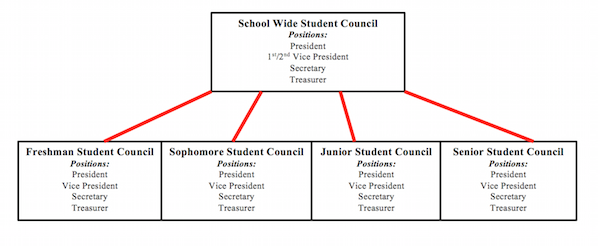
What Do Student Council Members Do?
In this section, I’ll discuss the general responsibilities of all members. I'll then go on to discuss the duties of specific officers (President vs. Secretary, etc.).
Duties for All Members
All student government members are responsible for attending meetings (usually weekly, though the specifics will vary from school to school). If you’re on a grade-level council, you’ll likely have meetings both with your grade-level council and the school-wide council. These weekly meetings include all members of the council as well as the faculty adviser. At these weekly meetings, members brainstorm events they'd like to plan and divvy up the tasks. Occasionally (typically once or twice each school year), the grade-level student councils will hold an open meeting to allow their classmates to come and voice their concerns or suggest ideas.
As I said above, members of the grade-level councils are responsible for planning and executing grade-level specific programs (such as creating a class t-shirt or organizing Junior Prom). Members of the school-wide council plan and execute programs for the entire school (such as Homecoming Week or a school-wide fundraiser).
In addition, members of grade-specific councils are responsible for assisting the school-wide council in planning and running major school-wide events such as the Homecoming parade, Homecoming dance, and pep rallies.
Typically, senior student government members have an obligation after graduating from high school: planning your high school reunions.
What Are the Position Specific Duties?
I’ll go down the hierarchy. The duties of each position remain the same whether it’s for the freshman council or school-wide council. As I said above, every member is responsible for attending meetings and helping make school events happen. The duties listed below are the additional duties for each position.
President: Responsible for planning and running meetings (i.e. creating meeting itineraries, facilitating discussions), delegating tasks (i.e. deciding who on the council will be in charge of finding someone to design the class t-shirt, who will be responsible for finding a company to print the t-shirt), and for holding people accountable (i.e. making sure people complete their assigned tasks).
1st / 2nd Vice President: Responsible for assisting the president (i.e. running meetings in their absence, making sure people are completing assigned tasks, etc.)
Secretary: Responsible for taking notes at all meetings and emailing those notes to all council members.
Treasurer: Responsible for budgeting and managing money (i.e. collecting money when selling tickets for Homecoming, depositing that money into the proper account, keeping records).

How Can You Join Student Council?
To be in student government, you need to be elected. Elections for freshman student council typically happen at the beginning of the school year, in the fall. Elections for sophomore, junior, senior, and school-wide student councils typically happen near the end of the school year before summer vacation. You usually have to sign up to run. Make sure to talk to the front office at your school and ask how to sign up to run for student government.
If you’re trying to run for a position for the first time (i.e. you’ve never held a position on student council at your high school before, whether as a freshman, sophomore, junior or senior), I recommend first trying to run for what are considered smaller positions: treasurer or secretary. There is usually less competition for these positions, which will make it more likely that you’ll be elected. Additionally, while these positions are considered smaller, you have the same responsibility as the president or VP, to help plan and execute great events.
If you hope to be class president someday, you can prove yourself in a smaller position and then run for bigger positions in future elections. I started as my freshman treasurer, then became sophomore VP, then junior class president, and I became Student Government President my senior year. No matter what position you run for, how you campaign is important. You only need one tip to win your campaign...
The Most Important Campaign Tip: Make Sure People Know (and Trust) You!
Plain and simple, you will not win your campaign if only ten people know who you are. You will also likely not win if your entire grade knows you, but only as the person failing all of your classes or the person who doesn’t take anything seriously (aka class clown). To win the campaign, you need to make sure people know you and trust you.
How do you get people to know you? If your school allows it, make posters, stickers, pencils, etc. with your name on it. The size of the posters doesn’t matter, but the quantity does. It’s better to print 50 posters on printer paper than to make 10 on fancy posterboard. You want people to see your name so that they can talk to their friends about you and try to figure out who you are before election day.
Next, start to develop your campaign platform or main focus. Why do you want to be on student council? Do you want to improve school dances? Do you want to have a wider variety of school lunch options? Create a class field trip? Start a fundraiser? Having a focused platform will help you seem trustworthy and will help you stay motivated.
Now you have to spread your message. During your lunch period, you should not be sitting down; instead, walk around the cafeteria or campus. Introduce yourself! Hand out pencils and stickers. Talking to people is your best weapon. Tell them about yourself and why you want to be part of student government. Ask them what events they’d like to see planned this year or what ideas they have. However, you don't want to annoy other students (if you do, you definitely won't get elected), so try to cap yourself at 2-3 minutes of chatting, and then move on to another group.
How do you get people to trust you? This is a more difficult task. Talking to people and asking about their ideas will help build some trust. To continue to build trust, you need to show your competence in the classroom. Make sure you’re known as the person who does all of their homework, gets good grades, engages in class discussions, etc. Don’t be known as the person who is always late to class or on their cell phone.
How to Ace Your Campaign Speech
Some schools allow campaign speeches (mine didn't!). Speeches provide you with another opportunity to show that you're trustworthy. Here are my bullet points for a good campaign speech:
- Introduce yourself (It may seem obvious, but it will help students who may not know you).
- “Hi, I’m John Doe, and I’m running for sophomore class secretary.”
- Say why you want to be on student council and why you’re qualified. Your qualifications will be a combination of personal characteristics and past experiences and successes.
- “I'm an excellent note-taker. I served as drama club secretary.”
- State your campaign platform or main focus .
- “I want to plan a class trip to Disney.”
- Explain how you plan to accomplish your goals.
- “I will raise the money for the class trip by hosting a school-wide hot dog eating contest.”
- End with your name (again, it'll help students who may not know you).
- “Remember, vote for John Doe for s ophomore class secretary .”
These should be the main points you hit, but also, try to inject some humor into your speech to make it more entertaining. Your speech should NOT be too long (I’d recommend 2-3 minutes maximum). Make it brief or you’ll lose your audience.
What Are the Benefits of Joining Student Council?
By joining the student government, you’re able to influence your high school. You can start new events and fundraisers. For example, as student government president, I started a donation drive to collect used prom dresses for a non-profit called Becca’s Closet . If there are things that bother you about your school that you'd like to improve, student council gives you an opportunity to do so. If you hated the Homecoming dance last year, you could plan a better event. Instead of having the Homecoming dance in your gym, you can move it to a hotel ballroom. If you dislike school lunches, you can try to change the menu.
Student government also gives you a great leadership experience to discuss on your college application. Colleges like to see leadership experience and involvement on your resume. It shows that you can get involved in your school and improve things, which makes colleges think that hopefully you would do the same at their school.
Be aware that there are potential drawbacks to joining student council. You might get blamed or criticized if people don’t enjoy your events. Nothing is worse than the class t-shirt. Someone is always unhappy and doesn’t like the design.

Should You Join Student Council?
If you’re truly interested in planning school events and organizing fundraisers, then YES! If you’re just looking for another activity on your resume, then NO! Colleges aren’t looking for students with a laundry list of activities on their resume. Colleges are looking for students who do one thing and who do it VERY well. For more on this, read our article, How to Get Into Harvard and the Ivy League, by a Harvard Alum.
If you love the idea of improving your school, then make student council your main extracurricular . Don’t be a mediocre student government member! To be an effective member of student council, make sure you have the time to commit to it. You'll want to have at least five hours per week to dedicate to student council. Plan on one hour for meetings and four hours for event planning or executing events. Be on time to meetings and events. Show up to meetings with ideas for events. Take charge of event planning. Try to plan the best events your school has ever had. Plan new amazing fundraisers! Try to make real positive changes at your school!
What’s Next?
Interested in learning about other great extracurricular opportunities? Learn more about job shadowing , community service , and volunteer abroad programs.

As an SAT/ACT tutor, Dora has guided many students to test prep success. She loves watching students succeed and is committed to helping you get there. Dora received a full-tuition merit based scholarship to University of Southern California. She graduated magna cum laude and scored in the 99th percentile on the ACT. She is also passionate about acting, writing, and photography.
Ask a Question Below
Have any questions about this article or other topics? Ask below and we'll reply!
Improve With Our Famous Guides
- For All Students
The 5 Strategies You Must Be Using to Improve 160+ SAT Points
How to Get a Perfect 1600, by a Perfect Scorer
Series: How to Get 800 on Each SAT Section:
Score 800 on SAT Math
Score 800 on SAT Reading
Score 800 on SAT Writing
Series: How to Get to 600 on Each SAT Section:
Score 600 on SAT Math
Score 600 on SAT Reading
Score 600 on SAT Writing
Free Complete Official SAT Practice Tests
What SAT Target Score Should You Be Aiming For?
15 Strategies to Improve Your SAT Essay
The 5 Strategies You Must Be Using to Improve 4+ ACT Points
How to Get a Perfect 36 ACT, by a Perfect Scorer
Series: How to Get 36 on Each ACT Section:
36 on ACT English
36 on ACT Math
36 on ACT Reading
36 on ACT Science
Series: How to Get to 24 on Each ACT Section:
24 on ACT English
24 on ACT Math
24 on ACT Reading
24 on ACT Science
What ACT target score should you be aiming for?
ACT Vocabulary You Must Know
ACT Writing: 15 Tips to Raise Your Essay Score
How to Get Into Harvard and the Ivy League
How to Get a Perfect 4.0 GPA
How to Write an Amazing College Essay
What Exactly Are Colleges Looking For?
Is the ACT easier than the SAT? A Comprehensive Guide
Should you retake your SAT or ACT?
When should you take the SAT or ACT?
Stay Informed
Get the latest articles and test prep tips!
Looking for Graduate School Test Prep?
Check out our top-rated graduate blogs here:
GRE Online Prep Blog
GMAT Online Prep Blog
TOEFL Online Prep Blog
Holly R. "I am absolutely overjoyed and cannot thank you enough for helping me!”

Student Council Speech
Student council speech generator.
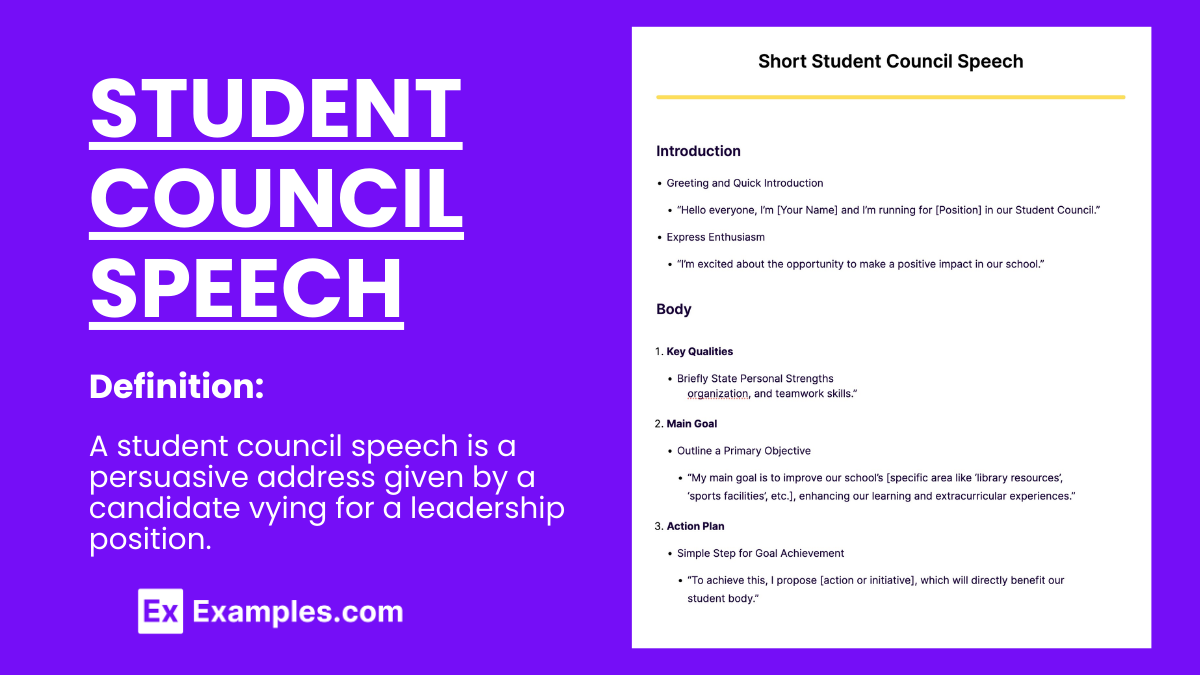
So you feel that you have what it takes to be part of your student council in your school. You got the guts, responsibility, wit, and charm to grab the position you are vying for from other students who are as qualified as you. Even if you are sure of yourself, you need to convince every student in your school that will be an effective officer if you are elected. And one way to convince your fellow students to vote for you is through your speech .
What is Student Council Speech? A student council speech is a presentation given by a student who is running for a position on the student council, which is a group that represents the interests and ideas of the student body at a school. In this speech, the candidate shares their ideas, goals, and plans to improve the school and address student concerns. They aim to persuade their classmates to vote for them by highlighting their leadership qualities, past achievements, and specific proposals for making positive changes within the school community. This speech is an important opportunity for candidates to connect with their peers and show why they are the best choice for the position.
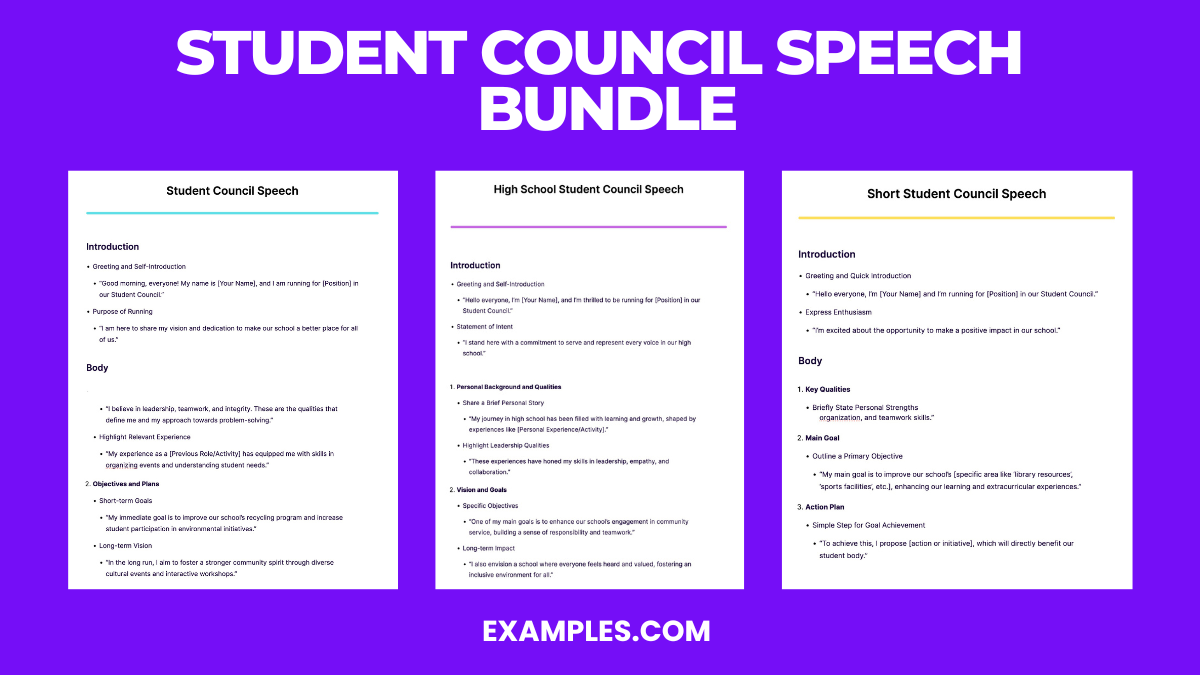
Download Sample Student Council Speech Bundle
When writing a student council speech, you must be able to persuade your schoolmates to trust in your abilities and your platforms. (If you need more tips on writing persuasive speeches , see this one). Remember, you are not running just for popularity votes or to earn yourself a good credential in your achievements. You are running for a certain position (whether you’ll be a president, treasurer, secretary, etc.) to serve the student body, to represent them when they want their needs to be attended to and to make better changes in your school. So first you need to make your speech sound persuasive, but not aggressive. Start writing your speech weeks ahead before you deliver your speech.

Student Council Speech Format
Introduction.
Greet the Audience: Start with a friendly greeting to capture the audience’s attention. Introduce Yourself: Briefly introduce yourself, including your name, grade, and any relevant personal background that relates to the position you’re running for.
Statement of Intent
Declare Your Candidacy: Clearly state the position you are running for on the Student Council. Motivation: Share why you decided to run for the student council, focusing on what motivates you and why the role is important to you.
Qualifications
Experience and Skills: Highlight your relevant experiences, skills, and achievements that make you a suitable candidate. This could include previous leadership roles, involvement in school activities, or specific talents that contribute to your ability to serve effectively.
Vision and Goals
Key Issues: Identify key issues or areas for improvement within the school that you plan to address. Proposed Initiatives: Outline your main goals or initiatives that you aim to implement if elected. Be specific about what changes or improvements you want to make and how you plan to achieve them.
Plan of Action
Strategies: Briefly describe the strategies or steps you will take to achieve your goals. This shows that you have thought about how to turn your ideas into action. Collaboration: Emphasize the importance of working together with fellow council members, students, and school staff to accomplish shared objectives.
Reiterate Key Points: Summarize the main reasons why you are the best candidate for the position, focusing on your vision, qualifications, and what sets you apart from other candidates. Call to Action: Encourage your classmates to vote for you, emphasizing the importance of their vote in making a positive change within the school. Thank You: Conclude by thanking the audience for their time and consideration.
Example of Student Council Speech
“Good morning, students and teachers of Springfield High! My name is Jamie Lee, a sophomore, and I’m excited to run for the position of Secretary on our Student Council. Why am I standing here today? Because I believe in change, in improvement, and most importantly, in us—as a student body—to make Springfield High not just a school, but a community where every voice is heard and valued. My experience as class representative last year taught me the importance of organization, communication, and dedication—qualities essential for the role of Secretary. My main goal is to enhance our school’s spirit and involvement through better-organized events, clearer communication between the student council and the student body, and by creating more opportunities for everyone to contribute their ideas and talents. I plan to introduce a monthly feedback session where you can share your thoughts and suggestions directly with the council. But that’s not all. I want to work on making our school events, including dances, fundraisers, and spirit weeks, more memorable and inclusive. How? By working closely with clubs and sports teams to ensure our activities reflect the diverse interests and talents within our school. I’m asking for your vote not just for me, but for the vision of a school where every student feels connected, involved, and proud to be a Springfield Hawk. Let’s make this year one of unity, fun, and achievement. Together, we can make a difference. Thank you for considering me as your next Student Council Secretary. Let’s soar high, Hawks!” This example of a student council speech uses a structured approach to convey the candidate’s motivations, qualifications, goals, and plans in a clear and engaging manner, effectively persuading classmates to lend their support.
What is the Best Student Council Speech Example?
Title: Creating Unity, Inspiring Change Good morning, fellow students, teachers, and staff, I stand before you today not as a candidate, but as a passionate advocate for positive change in our school. My name is [Your Name], and I am committed to fostering a sense of unity and bringing about real, impactful change. Imagine a school where every student’s voice is heard, where diversity is celebrated, and where kindness and respect are the foundation of our interactions. This vision drives my candidacy. 1. Unity Through Diversity: I believe in celebrating our differences. Let’s embrace our diverse backgrounds, interests, and talents to create a rich tapestry that makes our school vibrant and unique. 2. Student-Led Initiatives: I propose student-led initiatives that reflect our passions. From cultural awareness events to environmental projects, let’s turn our ideas into actions that benefit our entire community. 3. Mental Health Support: Mental health is a priority. I will work to expand counseling services, create safe spaces for open discussions, and promote stress-relief activities, ensuring every student’s well-being. 4. Interactive Learning: Let’s enhance our learning experience through interactive methods. I will advocate for technology integration, peer-to-peer tutoring, and hands-on projects that make education engaging and enjoyable. 5. Community Engagement: Our school is not just a building; it’s a part of our community. I will initiate partnerships with local organizations, organizing volunteer opportunities and outreach programs to give back and make a difference. In closing, I am not just asking for your votes; I am asking for your trust. Together, let’s build a school where every student feels valued, heard, and supported. Join me in creating a future where unity inspires change. Thank you.
Examples of Speeches for Student Council Representative?
Empowering student voices.
“Hello, everyone, I’m [Your Name], and I’m here to talk about empowering student voices. Our school is not just a place of learning; it’s a community, and in a community, everyone’s voice should be heard. As your student council representative, my mission is to bridge the gap between the student body and the administration. I will establish regular open forums where students can voice their concerns, ideas, and suggestions. These forums will be a platform for change, where we can work together to make our school an even better place. I’ll also implement an online suggestion box for those who may not be comfortable speaking up in person. Every idea counts, and every voice matters. Let’s make our school a place where students play an active role in shaping their own education. I promise to be your dedicated advocate, listening, acting, and ensuring that every student’s voice is heard. Vote for change. Vote for me. Thank you.”
Bridging the Gap
“Dear friends and fellow students, I’m [Your Name], and I’m running to bridge the gap between students and the administration. It’s time to foster a closer relationship that benefits us all. I propose regular meetings with teachers, administrators, and students to discuss school policies and improvements. Our education should be a collaborative effort, with students having a say in decisions that affect us directly. In addition, I’ll work to create an inclusive school culture. Let’s celebrate our diversity through cultural events, and ensure that every student feels welcome and valued. I believe in transparency and open communication. Together, we can make our school experience better for everyone. Vote for a bridge to a brighter future. Vote for me. Thank you.”
Building a Greener School
“Hello, fellow students, Our environment is a priority, and I’m committed to making our school more eco-friendly. As your representative, I’ll initiate ‘Green School’ initiatives. We’ll start with recycling programs and energy-saving projects. I’ll work to establish a school garden, promoting sustainable practices. Let’s reduce waste and show that we care about the future. Your voice matters. Tell me your eco-friendly ideas, and together, we can create a greener, healthier school. Vote for a greener future. Vote for me. Thank you.”
Student Council Speech Samples to Edit & Download
- Student Council Speech for Secretary
- Student Council Speech for 4th Grade
- Student Council Speech for Elementary
- Student Council Speech for 5th Grade
- Student Council Speech for Class Representative
- Student Council Speech for House Captain
- Student Council Speech for 3rd Grade
- Student Council Speech for Treasurer
- Student Council Speech for Vice President
- Student Council Speech for Election
Student Council Speech Examples & Templates
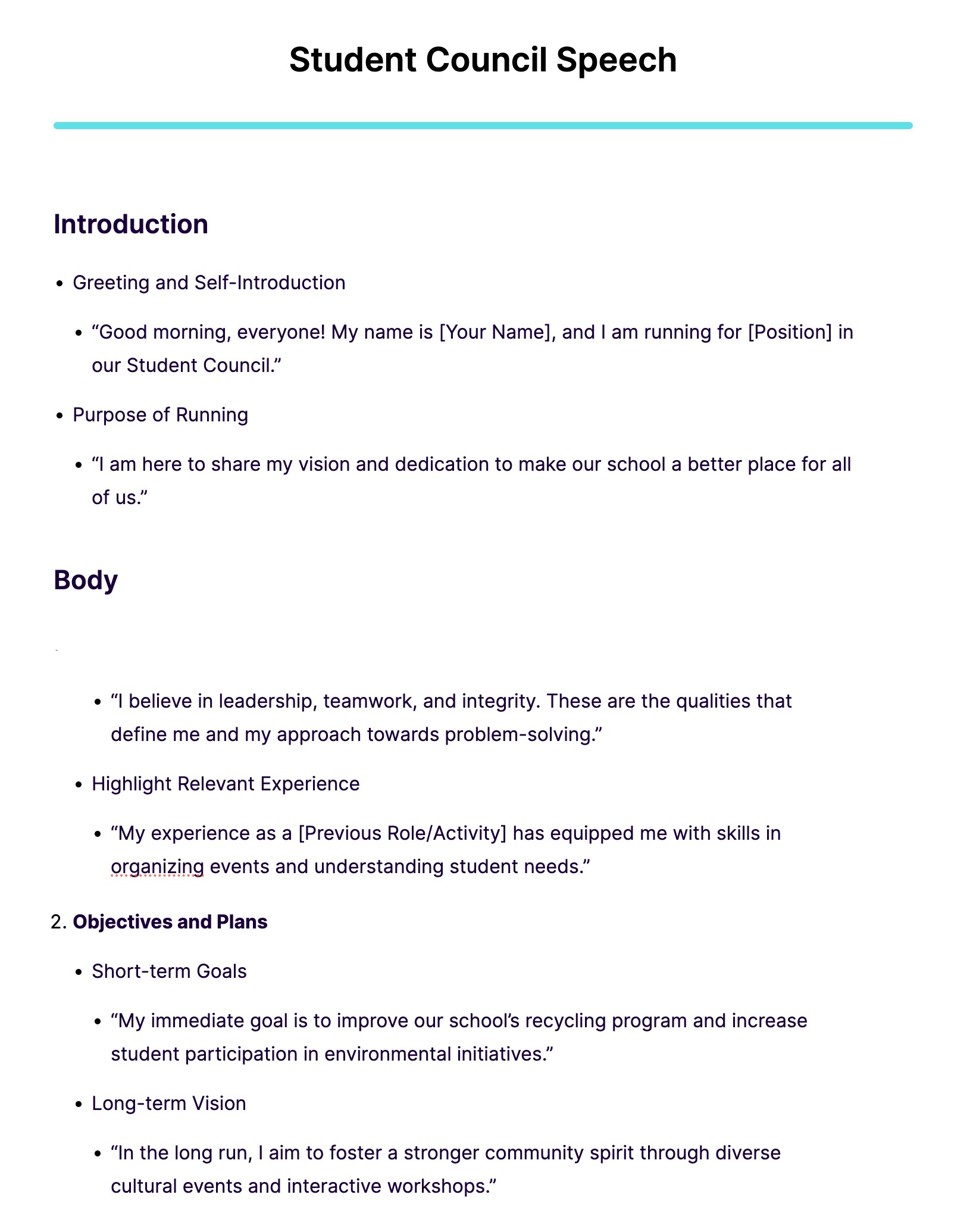
Free PDF Download
Funny Student Council Speech
High school student council speech.
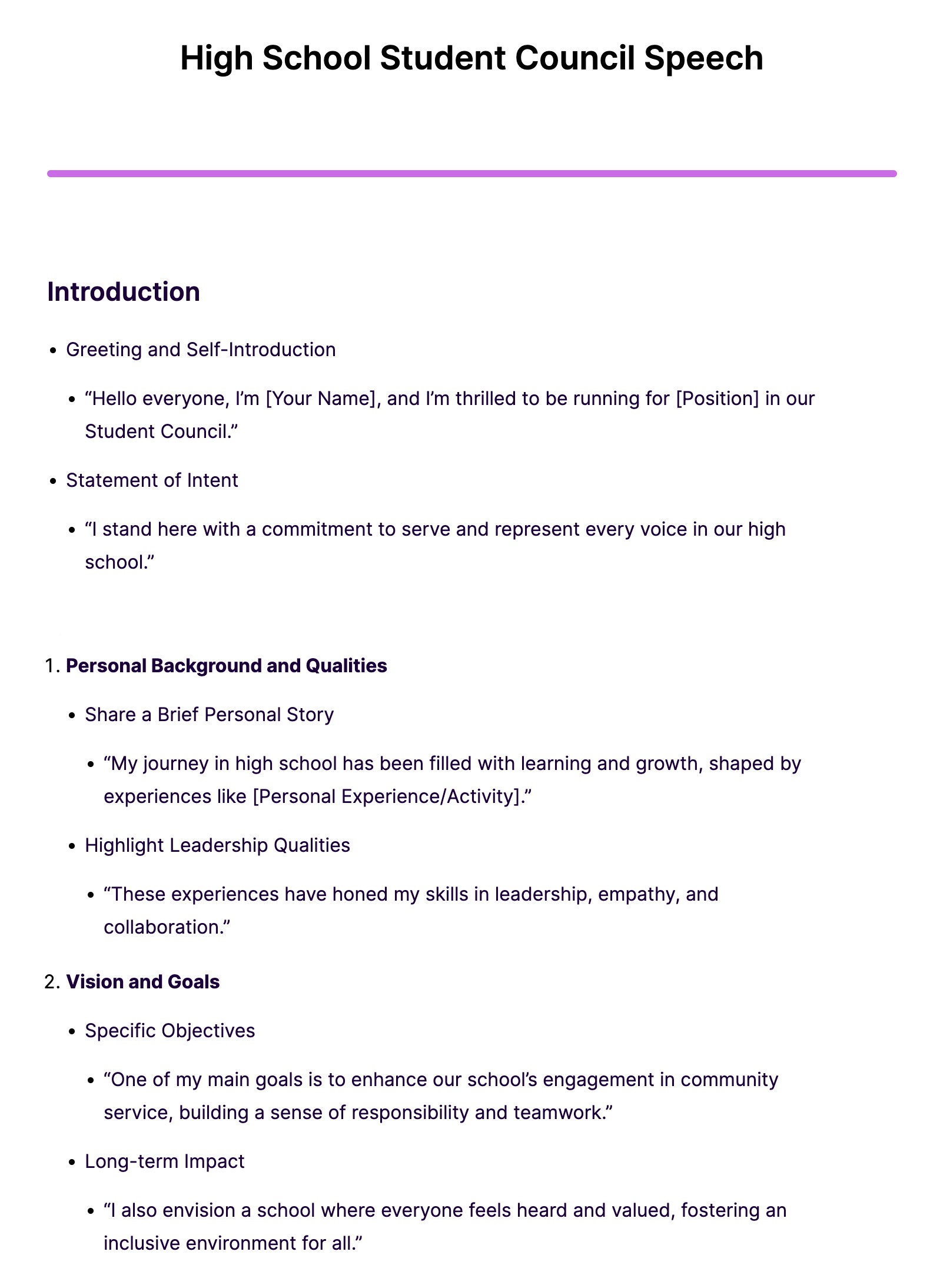
Edit & Download
Short Student Council Speech
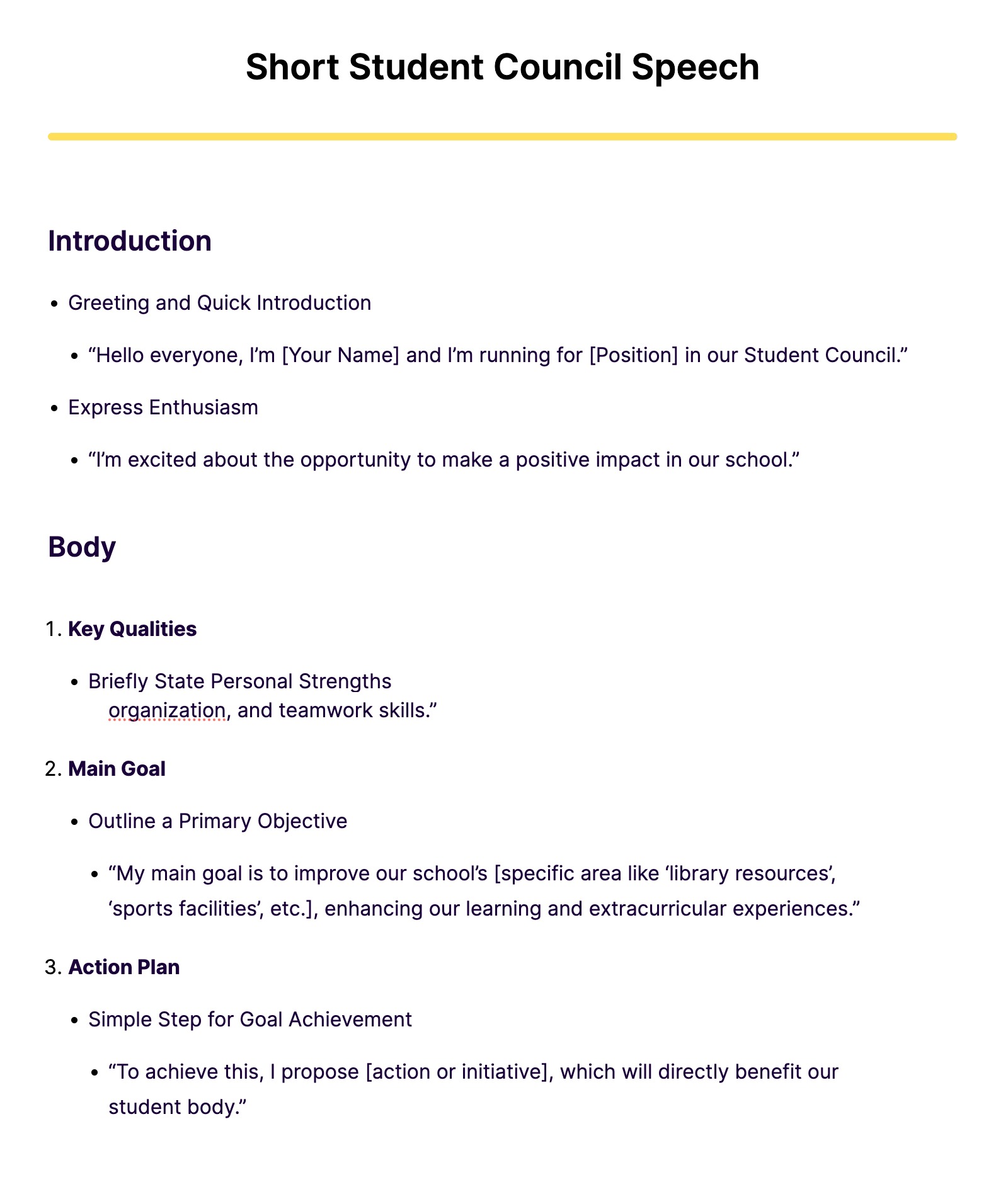
Short Student Council Secretary Speech
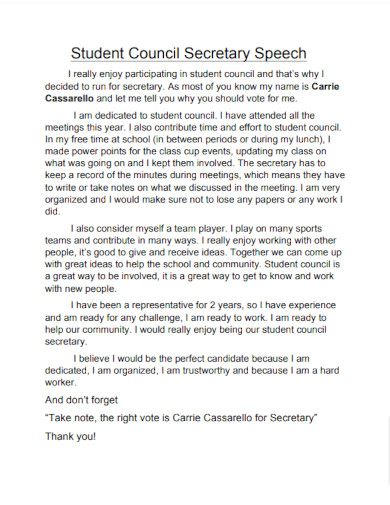
seaford.k12.ny.us
Sample Student Council Speech Guidelines and Schedule
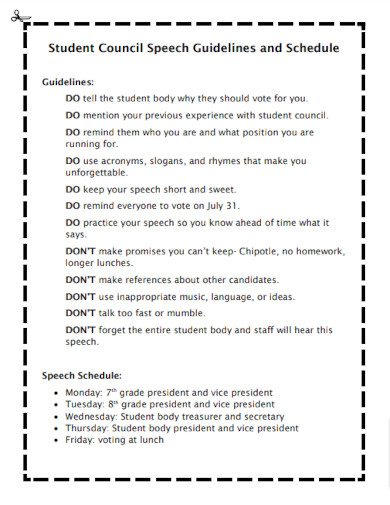
Speech Example for Student Council
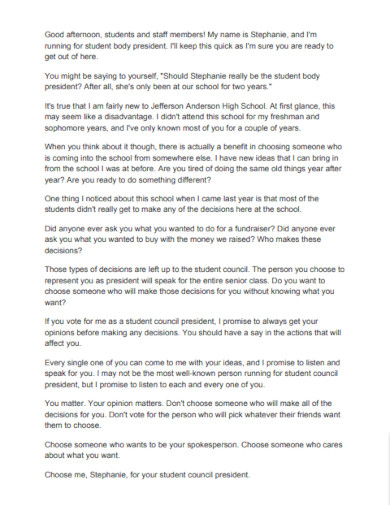
myperfectwords.com
Student Council President Speech
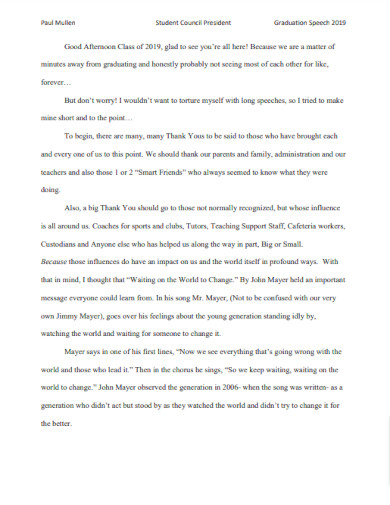
Junior Class President Speech
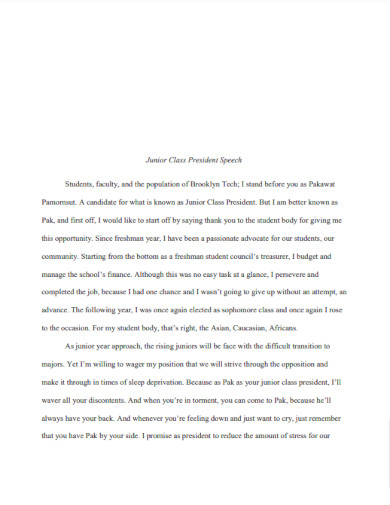
Student Council Campaign and Speech
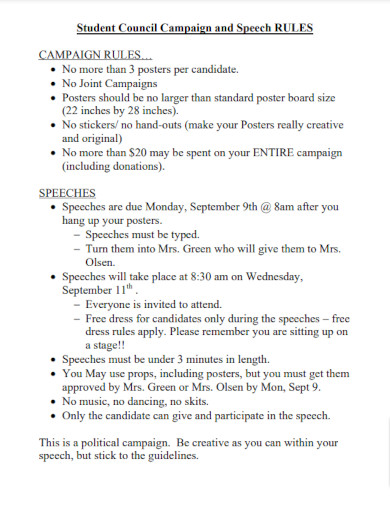
stignatiussacschool.org
High School Student Council Speech
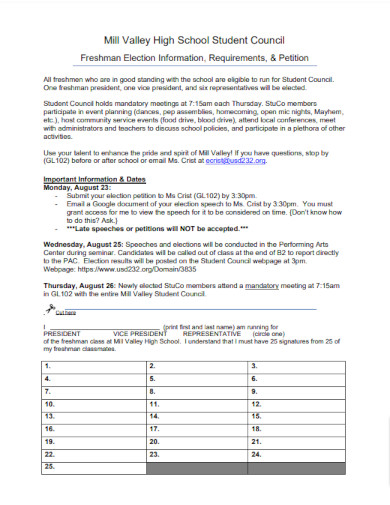
How to Write Student Council Speech
This is the most nerve-wracking part of your speech. So this part must be a good, no, great one. If for examples. you’re running for student council president don’t start just by merely introducing your name and telling them you are running for student council. You need to start your speech with a bang! Something that can catch the attention of your audience. Students are usually inattentive during these kinds of speeches so you need them to focus towards you. There are lots of creative ways to make a flashy opening. You can sing, rap, dance, act, do some comedy sketches, or anything that relates to the theme of your speech. However if you do not feel like performing live, you can still do some creative opening. You can use videos, power point presentation, music, or ask your friends to introduce you. You may also see introduction speech .
You can also open your speech by asking a question, whether if it is rhetorical or humorous. Here are some examples:
“So here is this person standing infront of you, asking you to for her. Why should you? You ask.” “If there’s anything you can do something for the school to make it loads better, what will it be?”
You can also add quotes from famous people that correlates with your speech. Make sure you cite your quotes properly. Here are some examples of quotes from well known people that you can cite:
“Leadership is not about the next election. It’s about the next generation.” Simon Sinek “I think leadership is service and there is power in that giving: to help people, to inspire, and motivate them to reach their fullest potential.” Denise Morrison “You need an attitude of service. You’re not just serving yourself. You’re helping others to grow up and grow with them.” David Green
After your awesome introduction, you then proceed to state all about yourself. Describe yourself, the position you are running for and the reason why you are running. Tell your name and your grade in your school. This is important if you go to a school with a big population. Don’t ever skip this part of speech as this will be what the audience should remember when it’s time to vote for you. You may also see thank you speech .
No need to elaborate in this part of speech. A brief 1-2 sentences are enough. Example:
“Hello. My name is John Cheese and I will be running for President! My vision is change for the betterment of our school. I fight for equality for all the students in this institution.”
Next is the part where you will sell yourself by mentioning your qualifications. This is one way to persuade your fellow students that you are responsible enough to be part of the student council. Mention any accomplishments that are related to the position your are running for.
If you’re running for president, don’t list your accomplishments in stamp collecting. The accomplishments that you should cite are your leadership skills, whether you are the team captain of your football team or you’re the major in your drum and lyre corp. You can also mention your honors and awards. You may also see speech templates .
“I am currently the team captain of our baseball team and I have also been a member of the Boy Scouts. Currently, I am the president of our drama club. I have also been an honor roll student for the past five years. I have been exposed to a lot of leadership training skills and I believe I am most qualified to be an efficient president in the student council.”

Writing the main point of your speech
Now that you have organize your introduction, it’s time to get to your ideas and how you should present them in front of the student body. This is the part where you will enumerate your platforms on how to improve the system in your school. Make sure that when you have laid out your platforms to the students you made some research. Ask the students, teachers, personnel on what areas that you should be improved.
Listen to what the students are concerned about. What are the changes that the students may want to see? What areas in your school you want to change to keep it running efficiently? You can also research ways on how to deal with school problems. Read books and ask some experts to help you. And find out how you, a member of the student council can address these problems. Once you already knew this, you will know what will be your platforms. A nice opening statement is to state out the causes that are important to you and what are your plans to make it better. You may also see special occasion speech .
“Bullying and discrimination has been more prevalent in this institution for the past year. As a student, I am disappointed that some of my fellow schoolmates has been the forerunners of this ugly way of treating people. And because of this, I would work out to invite speakers to talk about sensitivity in school, open more clubs for students to join, and start a tutorial program to aid students who are having a hard time in their classes.”
Keep in mind that you need to present your ideas briefly but persuasive enough to move your audience. If you need an inspiration, refer to Abraham Lincoln’s Gettysburg Address. His speech was short but full of key points that got his message across to his audience. You may also see self introduction speech .

End it with a memorable conclusion
1. Once you’ve stated your ideas effectively, it’s time for your conclusion. When you get there, go back to mention your plans as a president or a treasurer and relate it to your main points that you’ve mentioned a while ago. You may also see speech examples for students .
“With my experience in leadership training and in my service to my team members, I know I can be a great leader to each of you. I promise to do my best to stop discrimination and bullying and to increase the interest of the students to be more open to each other’s diversities.”
2. Don’t forget to highlight your qualifications one last time. They key to this is to sincerely state that it is your passion to serve your students. You may also see tribute speech .
“I am a passionate advocate against discrimination. And to change that attitude starts here in our school. I want everyone to be accepting of everyone’s differences. I vision an institution with good relations between students and faculty members. I care about each of you and your right to be treated fairly…”
3. Of course, don’t forget to ask the audience to vote for you. Here is the part where you will beg your students to vote for you. Their vote is important for you to win the election. Ask with genuine humility for the students to vote for you. You may also see informative speech .
“I ask nothing but your votes. I would be deeply honored if you’ll vote for me on the election day.”
Now that you completed your speech, see to it if it’s good enough for you to use. Ask a friend, a family member, or a teacher to read your speech. Ask them what areas you need to improve. Ask for a constructive criticism, even if it hurts.
It’s important for you to learn to improve your speech and to be open-minded towards critical suggestions. Remember you are running for the student council. Make yourself a best example of a responsible student that your fellow students can look up to. Additionally, debates may come up in before the election day, so make yourself familiarize with debate speeches .
What is a good speech for student council?
A good speech for a student council should be engaging, relatable, and persuasive. It should include:
- Introduction: Begin with a strong hook or personal anecdote to grab the audience’s attention.
- Your Vision: Clearly outline your goals and vision for the student council. Explain how you intend to make positive changes.
- Relevance: Address the specific needs and concerns of your fellow students. Show that you understand their issues and are committed to addressing them.
- Qualifications: Highlight your relevant skills, experience, and qualities that make you a suitable candidate.
- Ideas and Initiatives: Present concrete ideas and initiatives you plan to implement if elected. Be specific and practical in your proposals.
- Inspiration: Motivate your audience with an inspiring message that encourages unity and active participation.
- Closing: End with a strong call to action and a memorable closing statement.
Why do I want to run for student council?
- Leadership: Desire to take on a leadership role and make a positive impact on your school community.
- Advocacy: A commitment to representing and addressing the concerns and needs of fellow students.
- Service: A genuine interest in serving others and contributing to the betterment of your school.
- Initiative: Eagerness to implement positive changes, initiatives, and projects that benefit the student body.
- Voice: A belief in the importance of having a voice in the decision-making processes at your school.
- Personal Growth: Opportunity for personal growth, development of leadership skills, and networking.
- Passion: Passion for specific causes, clubs, or activities at your school and a desire to support them.
- Community Building: A goal to create a sense of community, unity, and school spirit among students.
- Inspiration: Being inspired by previous student council members or leaders who made a positive impact.
- Love for Your School: A deep affection for your school and a desire to contribute to its success and well-being.
What are the Good student council speech ideas?
- Mental Health Awareness: Discuss initiatives to promote mental health and well-being, such as counseling services, stress-reduction activities, or peer support programs.
- Diversity and Inclusion: Address the importance of diversity and inclusion, proposing events, clubs, or awareness campaigns to celebrate differences and foster unity.
- Student Engagement: Highlight the need for more student involvement in decision-making, suggesting forums, surveys, or open discussions for students to voice their concerns.
- Environmental Sustainability: Propose eco-friendly practices, like recycling programs, tree planting, or energy conservation efforts, to make your school more sustainable.
- Bullying Prevention: Talk about strategies to combat bullying and promote kindness and respect within the school community.
- Academic Support: Suggest peer tutoring programs, study groups, or additional resources to help students excel academically.
- Extracurricular Activities: Promote the creation of new clubs, sports, or arts programs to cater to a wider range of interests.
- Community Outreach: Encourage volunteer opportunities, partnerships with local organizations, and community service projects.
- School Safety: Address safety concerns and suggest measures to ensure a safe and welcoming school environment.
- Technology Integration: Propose the use of technology for educational enhancement, including virtual resources and tools for remote learning.
- Student Wellness: Advocate for initiatives like healthy eating options, exercise facilities, or mindfulness practices to support student well-being.
- Peer Mentorship: Discuss the benefits of mentorship programs, where older students can guide and support younger ones.
What are the Topics Included for Student Council Speech?
Student council speeches can cover a wide range of topics, depending on the issues that matter most to your school and peers. Here are some common topics and themes to consider:
- Leadership and Service: Discuss your commitment to serving and leading your fellow students.
- Unity and Inclusivity: Emphasize the importance of fostering an inclusive and welcoming school community.
- Student Voice: Highlight the need for students to have a say in school decisions and policies.
- Academic Excellence: Talk about ways to improve academic support, resources, and educational opportunities.
- Mental Health and Well-being: Address the importance of mental health support and stress reduction.
- Diversity and Cultural Awareness: Celebrate diversity and promote cultural awareness and understanding.
- Environmental Initiatives: Propose eco-friendly projects and sustainability efforts for the school.
- Bullying Prevention: Discuss strategies to combat bullying and create a safer, kinder school environment.
- Community Outreach: Advocate for volunteer opportunities and partnerships with local organizations.
- Technology Integration: Propose using technology for educational enhancement and virtual resources.
- School Safety: Address safety concerns and suggest measures to ensure a safe school environment.
- Peer Mentorship: Talk about the benefits of mentorship programs to support academic and personal growth.
- Student Well-being: Discuss initiatives like healthy eating options, exercise facilities, or mindfulness practices.
What are the Quotes to put in a student council speech?
- Be the change you wish to see in the world.” – Mahatma Gandhi
- “Leadership is not about being in charge. It is about taking care of those in your charge.” – Simon Sinek
- “The future belongs to those who believe in the beauty of their dreams.” – Eleanor Roosevelt
- “In diversity, there is beauty and strength.” – Maya Angelou
- “You are never too old to set another goal or to dream a new dream.” – C.S. Lewis
- “The only way to do great work is to love what you do.” – Steve Jobs
- “Leadership is not a position or a title; it is action and example.” – Cory Booker
- “Don’t watch the clock; do what it does. Keep going.” – Sam Levenson
- “We may encounter many defeats, but we must not be defeated.” – Maya Angelou
- “The best way to predict the future is to create it.” – Peter Drucker
- “Unity is strength… when there is teamwork and collaboration, wonderful things can be achieved.” – Mattie Stepanek
- “Success is not final, failure is not fatal: It is the courage to continue that counts.” – Winston Churchill
- “Education is the most powerful weapon which you can use to change the world.” – Nelson Mandela
- “Your time is limited, don’t waste it living someone else’s life.” – Steve Jobs
- “The best leaders are those most interested in surrounding themselves with assistants and associates smarter than they are.” – John C. Maxwell
How to start a student council speech?
Begin a student council speech with a compelling and attention-grabbing opening, like a quote, personal anecdote, or thought-provoking question, to engage and captivate your audience from the start.
What is the main idea of student council?
The main idea of a student council is to represent and serve the interests of the student body, fostering leadership, organizing events, and improving the school community.
How do I run a good student council?
To run a good student council, prioritize communication, listen to peers, set clear goals, organize effective events, and collaborate with the school administration to address students’ needs and concerns.
Text prompt
- Instructive
- Professional
Write a Student Council Speech on improving school lunches.
Create a Student Council Speech about enhancing school spirit.
What are your chances of acceptance?
Calculate for all schools, your chance of acceptance.
Your chancing factors
Extracurriculars.
How to Campaign for Student Council

Do you have a plan for applying to college?
With our free chancing engine, admissions timeline, and personalized recommendations, our free guidance platform gives you a clear idea of what you need to be doing right now and in the future.
If you’re a high school student thinking about college admissions, you’ve probably already done a bit of research into the factors that are weighed on your college application. You also probably know you’ll need to list your extracurricular activities and achievements. But have you considered how these activities and achievements will be weighed?
As college admissions committees evaluate the quality of your extracurricular experiences, they will look largely for signs of dedication and signs of leadership skills. If you’re involved in student government, this is good news, since student government requires both dedication and leadership skills from its participants. Achieving a leadership position in student government is even more convincing evidence of your dedication and commitment, so it can be a great boon on your college applications.
Often, these student leadership positions require that you take part in an election. Running for any office isn’t easy since you have to put yourself out there to be judged by your peers, but doing so is a great way to gain leadership experience. If you’re thinking about campaigning for a position in the student government, this is the post for you. In this article, we will outline how to plan and run a successful campaign for student body elections.
Here are seven essential steps to successful campaigning in the student body election.
1. Lay the Groundwork Early
While it’s certainly possible to come seemingly out of the blue and take an election by storm, that’s more common on the big screen than it is in real life. You’re better off laying a solid foundation early on if you intend to make a serious bid for a leadership position.
You can show that you’re serious about serving your school community by getting involved during your earlier years of high school and sticking with it over time. Gradually build up your experience so that a leadership position is the next logical step in your involvement. You will gain not only valuable experience and insight into how student government runs, but also connections with the peers and faculty with whom you’ll be working.
Laying the groundwork early also means being friendly and personable to your peers not only in the months leading up to the election, but also in the years prior. If you want to be a leader and a voice for your classmates, you’ll need to establish yourself as trustworthy and relatable. Your peers need to feel like they can communicate with you about their desires and needs at school. To create this level of comfort, you’ll need to start building your reputation early. The trust you establish over time can’t be faked in just a few months.
You’ll also need to learn about prerequisites for running for student council. Some schools have stringent standards that must be met including minimum GPAs, lack of disciplinary infractions, or provision of teacher recommendations. Be sure that you can meet these requirements before you put any serious effort into moving forward.
2. Set a Budget
It’s most likely that you’ll have to pay for your campaign out of your own pocket, so it’s best to set a budget in advance to ensure that you control costs. Even small expenses can add up to surprising sums over time.
Consider how much supplies will cost for posters, buttons, stickers, or any other campaign materials that you might hand out. Price out different options to ensure that you’re getting a good deal or solicit donations of office supplies from local stores to help control costs.
Also think about setting some money aside to thank your volunteers. Treating them to some donuts or even a few pizzas at the end of the campaign is a great way to express your appreciation.
3. Create a Mission
You can’t run a campaign without a clear vision of what you stand for and intend to accomplish as a student leader. Create your own mission statement early on and return to it throughout your campaign to stay true and accountable to your beliefs.
In order to create a mission statement, consider what you will do as a leader that is unique. Think critically about what issues matter most to you and what changes you will make. Discuss with various student groups which areas they perceive as being most in need of change and weigh that input also.
Think carefully about the difference you will make as a leader and use those goals as the platform for your campaign. Make these ideas to central to any and all campaign materials and communications.
4. Build a Team of Volunteers to Help
The nature of student elections is very social, so it makes sense that you won’t be able to conduct a successful campaign by yourself. You’ll need a whole team of helpers to spread your message, lend a hand, and donate their time and energy towards your cause.
Compile a group of friends and like-minded peers to help with your campaign. Try to get students involved from broad social groups so that you can have many voices to draw on and a broad audience for them.
Your team can help with everything from posting about your campaign on social media, to creating posters, to spreading the word verbally. Expanding your reach so that as many students as possible know about your campaign and the mission behind it should be a primary goal. You’re bound to attract more voters if they know what your campaign is all about.

Discover your chances at hundreds of schools
Our free chancing engine takes into account your history, background, test scores, and extracurricular activities to show you your real chances of admission—and how to improve them.
5. Use Social Media to Your Advantage
Gone are the days of limiting your efforts to plastering posters all over the school and handing out cupcakes. The social media age has made it easier than ever to connect with your peers, and you need to capitalize on this as much as possible.
Create a Facebook page for your campaign where you can clearly outline your objectives and the reasons you’re running. Use it to interact with potential voters, answering any questions that might arise. Post messages, photos, and videos to align with your mission.
Also publicize important events on your Facebook page. Keep users engaged by posting general information that readers might find helpful, even if it isn’t specifically related to the election. Occasionally posting information about SAT registration deadlines, school dances, or upcoming sport or theater events might be of interest to your audience. If your site can be a valuable resource, you will find that more students interact with it.
Also consider creating an Instagram account that is linked to your Facebook account. This may garner an even broader reach. Make up your own hashtag and encourage others to use it too. Increase your visibility online by interacting with other student groups and pages.
6. Run a Positive Campaign
The current political climate in our country can sometimes get a little nasty, but you’re best off keeping your campaign positive. In general, and particularly at the high school level, negative campaigns have a tendency to turn people off. They are uncomfortable, give off a bad vibe, and can even make you appear mean or untrustworthy.
Instead, avoid slander and negative campaign techniques by focusing your efforts on building yourself up, rather than putting others down. Come up with a catchy campaign slogan that captures some of the positive things you intend to do in office. Build trust by running a mature and clean campaign.
If another candidate tries to slander you, rise above it. You can either ignore it completely, or acknowledge the concerns in a factual and brief statement before moving on. Don’t linger on negativity and don’t fall into the trap of lowering yourself to those standards, either. Build a campaign based on your own strengths and positive traits, not on the deficiencies of others.
7. Spread Your Word
The most effective way to gather voting support is by making sure that as many people as possible hear your message. By using some of the techniques above, like building a diverse campaign team and using social media, you’ll be able to get your message out there. But there are plenty of other ways to accomplish this, too.
Consider making posters to hang up around campus or flyers to hand out. Make buttons that supporters can wear or put on their backpacks. Create stickers featuring your campaign slogan or make a video outlining your mission. Make sure that every piece of campaign material clearly contains your name and the office that you’re running for—you don’t want there to be any confusion when voters are filling out their ballots.
Another idea for spreading the word about your mission is to organize and host a Meet the Candidate event. Get permission from your school to hold an informal gathering in a public space, like the library or an empty classroom. Schedule it for a time when students are generally available, either right after or just before school. Make yourself available to answer questions from any potential voters and hand out campaign materials, like stickers or buttons. Though it’s not entirely necessary, students will be more likely to attend if you are handing out some kind of freebie.
Alternatively, social media makes it possible to host these kinds of Q&As virtually. You can do a Facebook Live video to stream your answers, or simply respond in real time by typing your responses.
Running for any type of office can be a little intimidating. You are basically asking your peers to judge your ability to serve them. Don’t let it get to you, though. Student council elections can sometimes turn into petty popularity contests, but this isn’t their intention. By running a positive, well-planned, mature campaign, you will communicate that you are both ready and eager to stand up for your classmates and do the job to the best of your abilities.
Looking for help navigating the road to college as a high school student? Download our free guide for 9th graders and our free guide for 10th graders . Our guides go in-depth about subjects ranging from academics , choosing courses , standardized tests , extracurricular activities , and much more !
For more about student government and developing your leadership skills, see these CollegeVine posts:
- Should I Join Class Board or Student Government?
- How to Apply to the Senate Page Program
- Everything You Need to Know About Extracurricular Activities in High School
- Ten Skills to Highlight on Your College Applications
- How To Become President of Your High School Club
Want access to expert college guidance — for free? When you create your free CollegeVine account, you will find out your real admissions chances, build a best-fit school list, learn how to improve your profile, and get your questions answered by experts and peers—all for free. Sign up for your CollegeVine account today to get a boost on your college journey.
High School Graduation Year* 2017 2018 2019 2020 2021 2022 2023 Other
Can't see the form above? Subscribe to our newsletter here .
Related CollegeVine Blog Posts


How To Succeed In A Student Council Election
Catching the wave of change.
Imagine standing at the forefront of change within your school, where your voice becomes the catalyst for progress and unity. This is the essence of a student council election, an exhilarating journey that can redefine your high school experience. Engaging in a student council election is more than just a race for a title; it’s an opportunity to shape the student experience, create lasting impacts, and develop essential leadership skills. It’s about becoming a part of something larger than yourself, championing the causes close to your and your peers’ hearts, and being a pivotal force in steering the school’s culture and policies. This role isn’t just about representing students; it’s about being an advocate for change, a listener to diverse opinions, and a spokesperson for the collective voice.
The Journey Begins Here
Embarking on this journey requires more than just enthusiasm; it demands strategy, charisma, and a deep understanding of your fellow students’ needs and aspirations. Whether you’re an experienced leader or a first-time candidate, the path to success in a student council election is paved with dedication, creativity, student council ideas , and genuine intent to serve. This adventure isn’t solely about winning an election; it’s about personal growth, understanding the intricacies of leadership, and building a network of supportive peers and mentors. You’ll need to be both a visionary and a realist, capable of dreaming big but also setting actionable, achievable goals. As you step onto this path, remember that your journey will be a blend of challenges and triumphs, each a valuable lesson in leadership. Let’s dive into the world of student council campaigns and unravel the secrets to making your mark in this pivotal chapter of your academic life, a chapter that will not only shape your high school years but also equip you with skills and experiences that will benefit you long after graduation.
Understanding The Role
The heart of leadership.
Before leaping into campaign strategies for becoming student council president , it’s crucial to comprehend what the student council entails. Student council members, especially the president, are the bridge between the student body and the school administration. They advocate for student interests, organize events, and foster a sense of community. Understanding these responsibilities allows you to tailor your campaign message to reflect the role’s true essence. This role goes beyond mere representation; it involves being a proactive leader who initiates change, addresses student concerns, and works collaboratively with school authorities to implement solutions. A student council member must be a skilled communicator, capable of conveying the collective voice of their peers to the administration, and in turn, explaining the school’s policies and decisions back to the students. This reciprocal communication is vital for maintaining a harmonious and productive school environment.
Representing Your Peers
As a prospective student council member, your goal is to represent your peers effectively. This means being in tune with their concerns, ideas, and aspirations. Spend time listening and engaging with your classmates to understand their perspectives, which will be invaluable in shaping your student council campaign promises and actions if elected. Representing your peers also means advocating for inclusivity and diversity, ensuring that all voices are heard and considered in the decision-making process of the student council. It’s about being empathetic and understanding the different challenges and experiences of your fellow students. This role requires not just the ability to listen, but also the skill to synthesize these diverse opinions into a coherent and actionable plan that benefits the wider student body. In doing so, you become not just a representative, but a true leader who reflects the best interests of your peers.
Developing Your Campaign Strategy
Crafting your message.
A compelling student council campaign is built on a clear, resonant message. What do you stand for? How will you make a difference in the student council? Your message should reflect your values and vision for the school. Be authentic and ensure your promises are realistic and achievable for the student council. This involves not only identifying key issues that are important to the student body but also presenting innovative and practical solutions. Your student council campaign message should resonate with the diverse student population, addressing their varied needs and concerns. Think about how you can bring a unique perspective to the student council and communicate this effectively. Your message should be a blend of inspiration and practicality, showing that you are not just a dreamer, but a doer who can bring about real change in the student council.
Visibility Matters
In a student council election, visibility is key. Utilize posters, social media, and word of mouth to get your message across. Be creative but respectful with your campaign materials, ensuring they stand out and convey your message effectively. This is where your creativity can shine. Think outside the box to capture attention and create a lasting impression. Whether it’s through catchy slogans, engaging videos, or interactive social media campaigns, your goal is to make your presence known and your message clear. Remember, the more people see and hear about you, the more likely they are to remember you when it’s time to vote. However, it’s important to balance visibility with substance. Ensure that your campaign materials are not only eye-catching but also informative and reflective of your campaign goals. In this digital age, social media can be a powerful tool to reach a wider audience, engage in conversations, and build a community around your campaign. Use these platforms wisely to communicate your message and interact with your peers.
Engaging With Voters
The power of communication.
Communication is the cornerstone of any successful student council campaign. Develop a strategy to engage with your classmates through various channels. This could include classroom visits, social media engagement, and participation in school events. Remember, effective communication is as much about listening as it is about speaking. It’s about creating a dialogue where ideas can be exchanged and feedback can be gathered. Consider organizing small group discussions or Q&A sessions where you can directly address the concerns of your peers. Utilize online platforms to create polls or forums where students can easily share their thoughts and suggestions. In your communication, be clear, concise, and consistent. Your ability to effectively convey your ideas and respond to others will play a significant role in building trust and credibility with your electorate.
Building A Connection
Building a genuine connection with your voters is vital. Show them that you’re approachable, understanding, and eager to represent their voices. Share your experiences and relate to theirs, creating a campaign that resonates on a personal level. This isn’t just about broadcasting your message; it’s about fostering a relationship with your peers. Engage in conversations, both in person and online, to show that you are not only interested in winning their votes but also in understanding and addressing their concerns. Personal stories and experiences can be powerful tools in forming these connections. They humanize your campaign and help your peers see you as one of their own. Be present in the school community, not just as a candidate, but as a fellow student invested in the well-being and success of everyone. Your sincerity in wanting to make a positive difference should shine through in every interaction, helping you to not only win votes but also to earn respect and admiration from your peers.
Navigating The Campaign Trail
Staying positive and respectful.
Campaigns can be competitive, but it’s important to maintain a positive and respectful tone throughout. Avoid negative campaigning against your opponents, and focus on what you bring to the table. Remember, the way you conduct your campaign reflects your potential as a leader.
Handling Challenges
Challenges and setbacks are inevitable in any campaign. Stay adaptable and resilient, learning from any obstacles you encounter. This not only helps you navigate the campaign but also demonstrates your problem-solving skills and determination.
The Final Stretch
Making your mark.
As election day approaches, intensify your efforts. Revisit classrooms, hold a final rally, and ensure your message is clear and memorable. This is your chance to leave a lasting impression and solidify your position as a top contender.
The Power of A Positive Attitude
Maintain a positive attitude throughout the process. Regardless of the outcome, participating in a student council election is a valuable learning experience and an opportunity for personal growth.
Beyond the Election
Embracing the outcome.
Win or lose, the journey doesn’t end on election day. If victorious, it’s time to deliver on your promises and work diligently for the betterment of your school. If the outcome isn’t in your favor, use the experience to grow and consider other ways you can contribute to your school community.
Continuous Engagement
Stay engaged with the student council and your peers. Your involvement in school affairs can still make a significant impact, even outside of the council.
A Stepping Stone for Future Leaders
Running for student council is more than just a campaign; it’s a stepping stone for future leadership roles and an excellent way to contribute to your school community. Embrace this journey with passion, determination, and integrity, and you’ll undoubtedly leave a positive mark, regardless of the election’s outcome.
The Path Ahead
Remember, the skills and experiences you gain during this process are invaluable, setting a foundation for future success in various aspects of life. So, take this opportunity to grow, inspire, and lead. Your journey in the student council election might just be the beginning of a remarkable path in leadership and community involvement.
Related Posts
10 reasons why students should not have homework.
- March 29, 2024
Best Online Jobs For College Students
- March 26, 2024
How to Earn Money as a College Student
- March 20, 2024
How to Be a Good College Student: A Comprehensive Guide
- March 12, 2024
- Games, topic printables & more
- The 4 main speech types
- Example speeches
- Commemorative
- Declamation
- Demonstration
- Informative
- Introduction
- Student Council
- Speech topics
- Poems to read aloud
- How to write a speech
- Using props/visual aids
- Acute anxiety help
- Breathing exercises
- Letting go - free e-course
- Using self-hypnosis
- Delivery overview
- 4 modes of delivery
- How to make cue cards
- How to read a speech
- 9 vocal aspects
- Vocal variety
- Diction/articulation
- Pronunciation
- Speaking rate
- How to use pauses
- Eye contact
- Body language
- Voice image
- Voice health
- Public speaking activities and games
- About me/contact
- Speech examples
- Student Council speeches | Secretary
Student Council speech | Secretary
An example campaign speech for secretary
By: Susan Dugdale
So, you're running for the Student Council Secretary position and want to see a sample campaign speech to help you write one of your own.
There's an example below, as well as a list of the main tasks * of the Student Council Secretary. You'll want to be thoroughly familiar with all of them before you can begin on your speech!
- Student Council Secretary main tasks list
- Example Student Council Secretary speech
- Student Council speech printable planner and outline
- More Student Council speech resources
* (My list is general. Your school may have specific requirements that I've not noted. Double check to ensure you know what would be good to highlight in your speech prior to writing it.)

Student Council Secretary - main tasks
Are you organized? Are you good at communicating: making sure everyone knows what's going on? How are your administrative skills?
To be worthy of a YES vote from your fellow students you need all three of them!
The role of Student Council Secretary is key to ensuring the council functions smoothly and communicates effectively with students, faculty, and administration.
The main tasks and responsibilities of the position are:
- Record keeping : Maintaining accurate records of all council meetings which includes taking the minutes, preparing the agendas, and noting attendance. Ensuring that the minutes of meetings are distributed to Council members and, when necessary, to the student body.
- Correspondence and communication : Handling communication between the council, students, teachers, and administration. Relaying important information, announcements, and decisions made by the council to the student body.
- Meeting preparation : Assisting in the preparation of meeting agendas in collaboration with the Council President or the Student Advisor. Distributing agendas and other required relevant information to council members before meetings.
- Attendance tracking : Keeping track of attendance at council meetings and reporting any issues to the Student Council President or to the Student Council advisor. For example: repeated unexplained absenteeism or lateness.
- Archiving and documentation : Maintaining an organized archive of past meeting minutes, agendas, and other relevant documents for reference.
- Elections and voting : Assisting in organizing and overseeing Student Council elections, including the nomination processes and voting procedures.
- Committee support : Collaborating with other council members and committees to help them achieve their goals by providing administrative support.
- Event calendar maintenance + event planning : Maintaining/updating the school's event calendar Assisting in planning and organizing school events, fundraisers, and community service initiatives sponsored by the Student Council.
- Community outreach : Participating in or supporting outreach efforts to engage with the student body, gathering feedback, and promoting student council activities.
- Advocacy and representation : Serving as a voice for the student body by representing their concerns, ideas, and suggestions during council meetings.
- Collaboration and teamwork : Working closely with the Student Council President, Vice President, Treasurer, and other members to ensure the council operates effectively and achieves its goals.
- Adherence to bylaws : Ensuring that the Student Council operates in accordance with its constitution or bylaws and helping update these documents when necessary.
- Problem solving : Assisting in addressing and finding solutions to issues and challenges faced by the student body.
- Promotion of school spirit : Encouraging school spirit and pride through involvement in pep rallies, spirit weeks, and other activities that foster a sense of unity and belonging.
Return to Top
Example Secretary speech for Student Council
To get a good idea of how this speech works, read it through a couple of times and then try it out loud.
It's 474 words long which will take just over 3 minutes to say , depending on your speech rate .
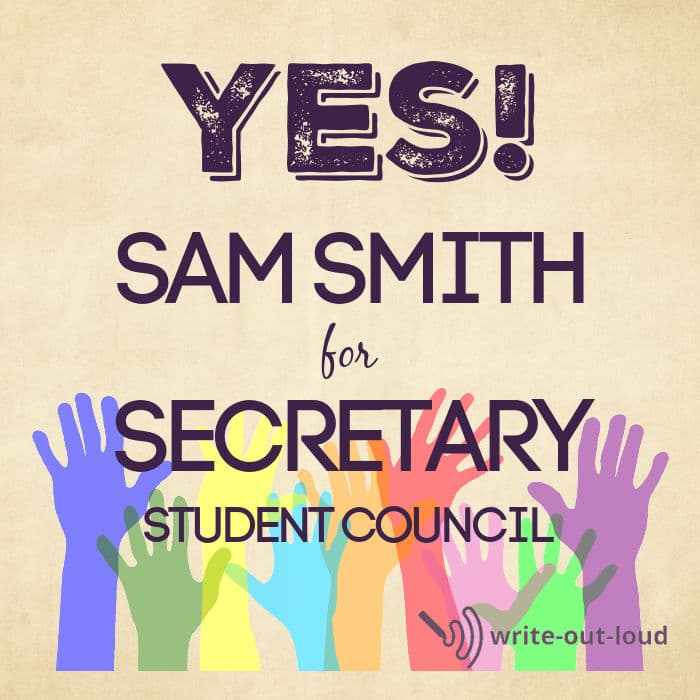
Don't you just love writing up notes, and scheduling activities? No? { said with a big smile ☺}
Fellow students, teachers, and staff of Cherry Landing College, fortunately I do!
That's why I'm here standing in front of you today. My name is Sam Smith, and I would sincerely appreciate the opportunity to serve you as your Student Council Secretary.
Excellent communication and organizational skills are essential for this role. As anybody who knows me knows, I have both of those, along with the determination to use them to benefit all of us.
The success of a Student Council is to a large extent determined by the efficiency and effectiveness of its communications. As your Secretary, I will make it my primary mission to ensure that information flows smoothly between the student body, teachers, and administration.
We know what happens when it doesn't flow as it should. And we don't like it. People feel excluded. Assumptions are made. Things quickly become unnecessarily chaotic - something we want to avoid!
Now, excellence in communication is underpinned by excellence in organizational skills. The first is impossible without the latter.
Again, I am known for my attention to detail and my ability to keep things well and thoroughly organized. From recording meeting minutes to maintaining a comprehensive calendar of events, you can rely on me to work diligently to keep our council running efficiently - a chaos free zone.
However, being Secretary isn't just about fulfilling administrative tasks well. It's about being a dedicated advocate for all of you. I promise to represent your interests and work to address any issues or challenges that may arise during the school year.
Whether it's improving the school facilities, advocating for more extracurricular activities, or addressing concerns about the cafeteria menu, I will be your voice.
Whoever you are, I promise to actively listen to your concerns, suggestions, and ideas, and to ensure that they are brought to the attention of the council.
In addition, I am fully committed to fostering a culture of inclusivity and collaboration within our school. I will actively seek out opportunities to bring students from different backgrounds and interests together. By doing so, together we will create a stronger, more united student body - a microcosm of the society we want to live in - one that supports us all.
In conclusion, I am ready and eager to serve as your Secretary. I bring a passion for communication, organization, and advocacy to this role. But most importantly, I bring a resolve to represent each and every one of you to the best of my ability.
Together, we can make our school a place where every student's voice is heard, and where positive change is always possible.
I ask for your support and your vote. Sam Smith for Secretary! Together, we can make a difference. Thank you.
Get a blank Student Council speech planner
Click on the image below to open a downloadable printable student council speech planner and outline pdf. (Please note it will open in a new window.)
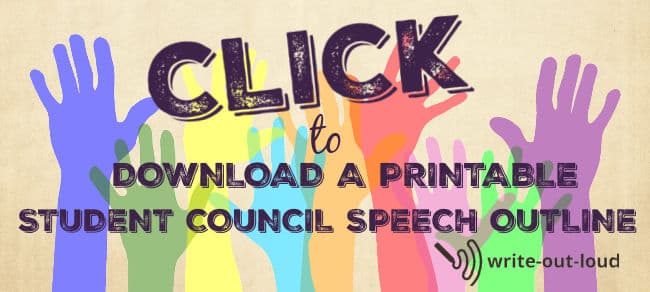
More resources for Student Council Speeches
If you've arrived on this page without seeing this one: Student Council Speeches , I highly recommend reading it before planning or writing your speech for Student Council Secretary.
You'll find:
- a list of important points you'll want to consider carefully before you start,
- another 2 example speeches - Student Council President and Student Council Vice President,
- tips for rehearsal or practice, and more.
Go to Student Council Speeches .
And click this link if you'd like to read an example Student Council speech for Treasurer .
speaking out loud
Subscribe for FREE weekly alerts about what's new For more see speaking out loud

Top 10 popular pages
- Welcome speech
- Demonstration speech topics
- Impromptu speech topic cards
- Thank you quotes
- Impromptu public speaking topics
- Farewell speeches
- Phrases for welcome speeches
- Student council speeches
- Free sample eulogies
From fear to fun in 28 ways
A complete one stop resource to scuttle fear in the best of all possible ways - with laughter.

Useful pages
- Search this site
- About me & Contact
- Blogging Aloud
- Free e-course
- Privacy policy
©Copyright 2006-24 www.write-out-loud.com
Designed and built by Clickstream Designs
Home — Essay Samples — Business — Leadership — My Leadership Experiences on Student Council
My Leadership Experiences on Student Council
- Categories: Leadership
About this sample

Words: 563 |
Published: Feb 9, 2022
Words: 563 | Page: 1 | 3 min read
Works Cited:
- Ann Schmidt. (2021, December 15). History of the Bill of Rights: The First 10 Amendments. Investopedia.
- Dahl, R. A. (2003). How democratic is the American Constitution? Yale University Press.
- Lemon v. Kurtzman, 403 U.S. 602 (1971).
- National Archives. (2022, February 22). The First Amendment.
- Richard Lui of NBC. (2019, May 3). Why press freedom matters. YouTube. https://www.youtube.com/watch?v=JP1pSY8Xsx8
- United States Courts. (n.d.). First Amendment. https://www.uscourts.gov/about-federal-courts/educational-resources/about-educational-outreach/activity-resources/first-amendment
- United States Senate. (n.d.). The Legislative Branch. https://www.senate.gov/general/Features/Constitution_day/Constitution.htm
- Zick, T. (2017). The First Amendment in the Trump era. Oxford University Press.

Cite this Essay
Let us write you an essay from scratch
- 450+ experts on 30 subjects ready to help
- Custom essay delivered in as few as 3 hours
Get high-quality help

Dr. Heisenberg
Verified writer
- Expert in: Business

+ 120 experts online
By clicking “Check Writers’ Offers”, you agree to our terms of service and privacy policy . We’ll occasionally send you promo and account related email
No need to pay just yet!
Related Essays
3 pages / 1531 words
7 pages / 3063 words
1 pages / 666 words
1 pages / 416 words
Remember! This is just a sample.
You can get your custom paper by one of our expert writers.
121 writers online
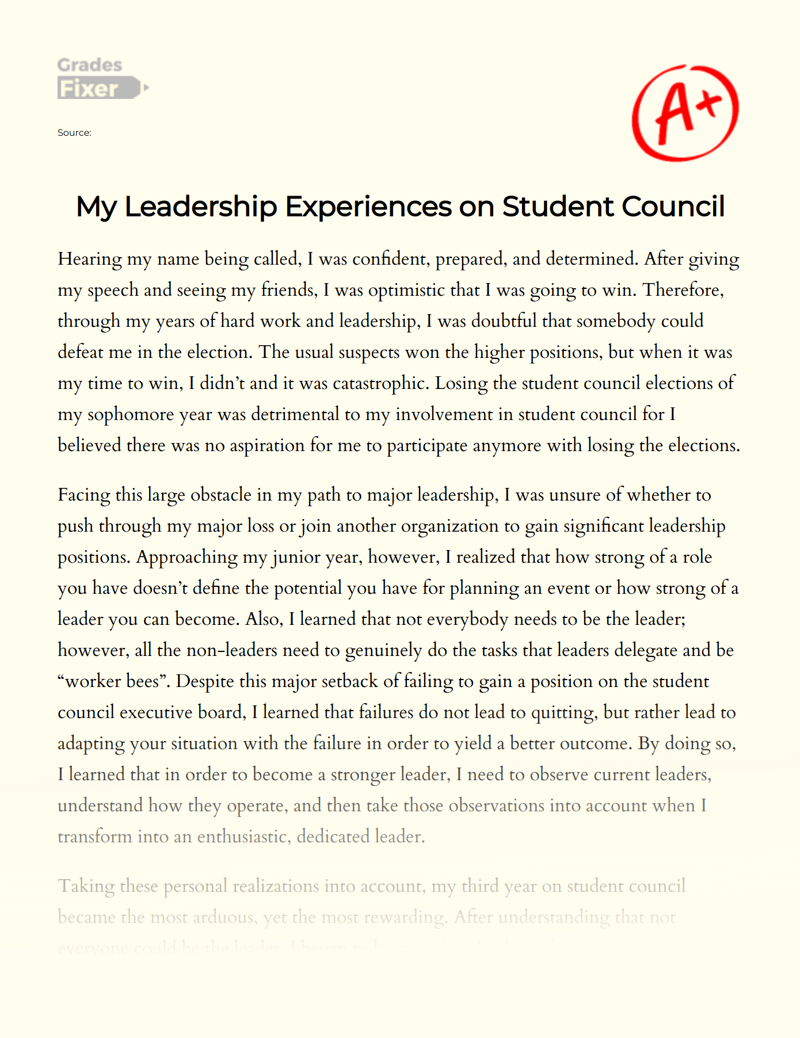
Still can’t find what you need?
Browse our vast selection of original essay samples, each expertly formatted and styled
Related Essays on Leadership
Mijares, Primitivo. 'The Conjugal Dictatorship of Ferdinand and Imelda Marcos.' Bookmark, 1976
A personal evaluation of strengths is a tool that must be understood to effectively lead people. An effective leader must know how to reach goals by motivating the team. There are many strengths that translate to leadership [...]
The concept of leadership is multifaceted, encompassing various theories and models that aim to understand the dynamics of effective leadership. The 5 Levels of Leadership Essay explores one such model, highlighting the five [...]
In the realm of leadership, the ability to inspire action among followers is a hallmark of greatness. This essay delves into the techniques and principles that effective leaders employ to motivate and mobilize individuals [...]
Mr. Ghosn, at 64 years of age, has bagged plenty of achievements in his pocket to boast. Having saved Japan’s second largest automaker from the brink of doom in 1999, he has become somewhat of a cultural icon and a hero to the [...]
Leadership is directing a group of people to work together towards a common goal while assuring nobody's fundamental human rights are taken away from them. While reading Lord of the Flies, many teachers and historians argue if [...]
Related Topics
By clicking “Send”, you agree to our Terms of service and Privacy statement . We will occasionally send you account related emails.
Where do you want us to send this sample?
By clicking “Continue”, you agree to our terms of service and privacy policy.
Be careful. This essay is not unique
This essay was donated by a student and is likely to have been used and submitted before
Download this Sample
Free samples may contain mistakes and not unique parts
Sorry, we could not paraphrase this essay. Our professional writers can rewrite it and get you a unique paper.
Please check your inbox.
We can write you a custom essay that will follow your exact instructions and meet the deadlines. Let's fix your grades together!
Get Your Personalized Essay in 3 Hours or Less!
We use cookies to personalyze your web-site experience. By continuing we’ll assume you board with our cookie policy .
- Instructions Followed To The Letter
- Deadlines Met At Every Stage
- Unique And Plagiarism Free

- Toggle navigation
- Our Strategy
- campaigns and welfare
- Members Code of Conduct
- Privacy Policies
- Officer Results 2024
- Officer Updates
- Activities & Opportunities Officer
- Campaigns & Democracy Officer
- Welfare, Community & Diversity Officer
- Undergraduate Education Officer
- Postgraduate Officer
- Part-Time Officers
- Alcohol Awareness Week
- Black History Month
- Disability History Month
- LGBT+ History Month
- Transgender Awareness Week
- Women's History Month
- World AIDS Day
- Adrian Flux Waterfront
- Daytime Events
- Give It A Go
- gigs - accessibility
- Student Nights - Accessibility
- Event T&Cs
- Academic Issues
- Housing Issues
- Cost of Living
- Don't Rent Yet
- Make a Complaint
- Discipline Issues
- Health and Personal
- Book an Appointment
- Get a Buddy
- Postgraduate SU
- Teaching Excellence Framework
- Academic Representatives
- Medicine & Health Sciences
- Decolonise UEA
- Transforming Education Awards
- Students of Colour Ambassadors
- Postgraduate Assembly and Voice
- What Is Postgraduate(su)?
- Information and Support
- Postgraduate Sports and Events
- Research and Reports
- Memberships
- Committee Hub
- UEA Media Collective
- Room and Hive Bookings
- Volunteering
- Care leavers and estranged students
- Commuter Students
- Faith and Spirituality
- International Students
- Mature Students
- Parent & Carers Network
- Advertise With Us
- HomeRun Landlords
Return to top

What is a manifesto?
A manifesto is essentially a statement of what you’d like to achieve over the year if you are elected as an officer! It is a short document which sets out the issues you care about and what you would like to see changed. Importantly, it is a key way that you’ll communicate why you’re the best candidate to voters. Your manifesto should lay out what you care about and what students can expect of you if you win the election!
It can be colourful and designed and will often feature key text points which are your manifesto.
Why is it important?
A manifesto tells people why you want to represent them and why they should vote for you; it sets out your ideas and plans. Your manifesto needs to say why you think you would be a good elected representative and what you would do if elected. It will also be a source of accountability should you be elected. Students will be able to track your progress in your role against what you promised to do in your manifesto.
You’re required to submit a manifesto as part of the nomination process.
Please ensure your manifesto follows this format:
- What do I want to do?
- Why should you vote for me?
- Slogan and/or hashtag
To upload your manifesto, visit the page you nominated on.
Getting started
Introduce yourself: You need to think about why you are running in the election, and why you feel you are the best person for this position. Draft something to get you started, using the pointers below and just get words on paper. It doesn’t matter if your first draft is bad as you will have time to improve this. It is useful to get feedback from your friends, course-mates, and other students. You should constantly be asking for advice and feedback from students - after all, these are the people whose votes are you trying to win! You can also contact current officers and/or staff about specific ideas, to see what has already been done or what is currently going on at UEASU.
Use concise, straightforward language, and keep things brief: Your manifesto is your opportunity to tell your peers why they should vote for you. It should outline who you are, what you will use your role to achieve, and the changes you aim to bring to UEASU. Think about where your manifesto will be displayed: would you stop to read it while walking by or scrolling through Facebook? Don’t add in anymore detail than you’d be bothered to read as a voter yourself! Short, sharp and concise is best.
Do your research: Do the changes you pledge to make appeal to a diverse range of voters, or just your social circle?
Be realistic and precise: Your term in office will last for 1 year: are your manifesto pledges achievable in this timeframe? What practical steps will you take to achieve your goals?
Communicate your skills, experience, and personality: Show voters who you are! What roles have you held before? How does your previous experience make you the best candidate?
Proofread! Make sure your manifesto reads well and is free from spelling mistakes. Use the spellcheck function on Word, or better yet, ask a friend to proofread!
Keep the focus on you: You have a limited number of words; use them to promote yourself rather than discrediting other candidates.
Ensure your manifesto is portrait!
Think about students!
As a Union we are trying to engage with our HSC students more this year. Due to the nature of their courses, a lot of HSC students find themselves on placement, or studying away from campus for long periods of time, making engaging with our channels more difficult. When writing a manifesto, think about way to include your HSC peers! Here are some fact sheets about our HSC students that you may find useful!
- HSC Factsheet
- HSC Factsheet - Education Officer
Top Ten Tips
Manifestos are an important part of the election – in 2017, 33% of student voters said they voted for a candidate because they agreed with their manifesto, so it matters a lot!
- Start with what you want to change
- Think SMART (are your goals: specific, measurable, achievable, relevant, time-bound?)
- Describe how students would benefit from your ideas
- Talk to current Officers and students when writing your manifesto
- Include something for everyone
- Use clear language and grammar. Spell-check your manifesto before submitting!
- Be creative – you want to stand out, not blend in
- Don’t get carried away or waffle to fill space
- It’s about you and your relevant experience - not your opponents
- Repeat your name and ask for their vote at the end
Examples of previous manifestos

Links and Resources
Start your campaign planning the right way with these resources.
Social Media
For all the latest updates over the 2024 election season, follow our social media channels below!
Essay on Election for Students and Children
500+ words essay on election.
Election is the process through which people can express their political opinion. They express this opinion by public voting to choose a political leader . Furthermore, this political leader would have authority and responsibility. Most noteworthy, Election is a formal group decision making the process. Also, the selected political leader would hold public office. The election is certainly a vital pillar of democracy. This is because; Election ensures that the government is of the people, by the people, and for the people.

Characteristics of Election
First of all, suffrage is an important part of Election . Most noteworthy, suffrage refers to the right to vote in Elections. The question of who may vote is certainly an important issue. The electorate probably never includes the entire population. Almost all countries prohibit individuals under the age of majority from voting. For example, in India, the age of majority is attainable at the age of 18 years.
The nomination of a candidate is also an important characteristic of Election. This means to officially suggest someone for Election. Nomination refers to the process of selecting a candidate for election to a public office. Furthermore, endorsements or testimonials are public statements to support a candidate’s nomination.
Another essential characteristic of Election is electoral systems. Electoral systems refer to detailed constitutional arrangements and voting systems. Furthermore, detailed constitutional arrangements and voting systems convert the vote into a political decision.
The first step is the tally of votes. For this purpose, there is the use of various vote counting systems and ballot. Then comes the determination of the result on the basis of the tally. Also, the categorization of most systems is as either proportional or majoritarian.
Scheduling refers to arranging and controlling of Elections. Elected officials are accountable to the people. Therefore, they must return to the voters at regular intervals of time. Elected officials must do that so as to seek a mandate to continue in office. Above all, most countries arrange elections at fixed regular intervals.
An election campaign is also an integral part of Election. Election campaign refers to an organized effort to positively influence the decision making of a particular group. Consequently, politicians compete with each other by trying to woo more and more individuals.
Get the huge list of more than 500 Essay Topics and Ideas
Importance of Election
First of all, the Election is a peaceful and efficient way of choosing political leaders. Furthermore, citizens of a Nation choose a leader by casting their votes. In this way, the citizens are able to choose an individual whose views appeal to them most. Hence, people are able to exercise their will in political leadership.
An election is an excellent opportunity for people to express their resentment. Most noteworthy, if people are unhappy with a particular leadership, then they can remove it from power. People can certainly replace an undesirous leadership with a better alternative through Election.
The election is a handsome opportunity for political participation. Furthermore, it is a way by which new issues can be raised in public. In most democratic countries, common citizens are allowed to contest elections independently.
Consequently, a citizen could introduce reforms which are not any political party’s agenda. Also, in most democratic countries, a citizen could form a new political party to contest Election.
Election helps keep the power of political leaders in check. The ruling parties cannot afford to do any wrongdoing to the public due to the risk of losing Election. Hence, Election serves as an efficient power check and control for those in the ruling power.
To sum it up, Election is the symbol of political freedom. Most noteworthy, it is the tool which puts authority in the hands of common people. Democracy certainly would be non-functional without it. People must realize the value of Elections and come out in large numbers to vote.
Q1 What are electoral systems?
A1 Electoral systems are detailed constitutional arrangements and voting systems. These detailed constitutional arrangements and voting systems convert the vote into a political decision.
Q2 How Election helps keep the power of the political leaders in check?
A2 Elections certainly help keep the power of the political leaders in check. This is because political leaders cannot afford to do any wrongdoing to the public due to the risk of losing Election
Customize your course in 30 seconds
Which class are you in.

- Travelling Essay
- Picnic Essay
- Our Country Essay
- My Parents Essay
- Essay on Favourite Personality
- Essay on Memorable Day of My Life
- Essay on Knowledge is Power
- Essay on Gurpurab
- Essay on My Favourite Season
- Essay on Types of Sports
Leave a Reply Cancel reply
Your email address will not be published. Required fields are marked *
Download the App

- School of Thought Blog
Students Gain National Voice Through Newly Elected Council
As the nation wrestles with critical issues from the future of education to democracy itself, student voices have been left out of the conversation—until now. NASSP recently held its first election for the newly created National Student Council . The ten students elected to the Council will advocate on behalf of millions of their peers on federal policies that directly shape their educational experiences. NASSP’s National Association of Student Councils (NASC) will administer the Council. “I am ecstatic to have the privilege to represent the hearts of student leaders nationwide; it’s an honor that I will not take lightly,” said Anjali Verma, president of the National Student Council and a high school junior in West Chester, PA.
Amplifying Student Voices on the National Stage

For too long, student perspectives have been overlooked in decision-making processes that directly affect their lives and futures. A recent survey found that nearly two-thirds of 12- to 17-year-olds felt elected officials did not reflect the needs and experiences of young people. A 2022 NASSP survey found that only 11% of students report their opinion is represented “a great deal” at the federal level.
The National Student Council aims to change that by ensuring student insights drive meaningful reforms. “We are thrilled to welcome these exceptional student leaders to the National Student Council,” said Ronn Nozoe, CEO of NASSP. “By collaborating directly with these student representatives, we can ensure that student insights drive meaningful reforms that truly address their needs and priorities.”
Meet the Newly Elected Council Members
The 2024–25 National Student Council Officers are :
- President Anjali Verma , a junior at Pennsylvania Leadership Charter School in West Chester, PA
- Vice President of Leadership Development Kaylyn Woods , a sophomore at William M. Davies Career & Technical High School in Lincoln, RI
- Vice President of Service Jacqueline Rogers , a junior at Jefferson City High School in Jefferson City, MO
- Vice President of Membership Paige Goble , a sophomore at Lake Braddock Secondary School in Burke, VA
- Vice President of Communications Jamyson Posey , a sophomore at Fairmont Senior High School in Fairmont, WV
- Secretary Khadija Sissoko , a junior at Ocean Lakes High School in Virginia Beach, VA
- Junior Vice President of Leadership Development Jocelyn Ridenour , a seventh grader at Margaret Buerkle Middle School in St. Louis, MO
- Junior Vice President of Service Evan Rawls , a seventh grader at John P. Freeman Optional School in Memphis, TN
- Junior Vice President of Membership Isabella Schmit , a seventh grader at Tuloso-Midway Middle School in Corpus Christi, TX
- Junior Vice President of Communications Jaycee Lang , a sixth grader at Mexia Junior High in Mexia, TX
Voices From the Council
The newly elected council members expressed their excitement and commitment to amplifying student voices on a national scale.
“Being the first student from West Virginia to serve on the NSC is a huge responsibility, but I am ready to take on the task. I am honored to be serving and can’t wait to start this journey with my fellow officers and NASC!” –Jamyson Posey.
“I am beyond thrilled to join the National Student Council and represent student voices from across the country! This opportunity is an extreme honor that will allow us to bring our unique perspectives to the forefront, ensuring that the decisions impacting our education are truly reflective of our needs and experiences.” –Khadija Sissoko
“Connection and collaboration are what truly grows student leaders across the country. I can’t imagine a better organization to form those connections than the National Student Council, and I can’t think of a better group than this collection of talented officers. I’m honored to be among them, and eager to start implementing our collective goals.” –Paige Goble
A Brighter Future for Student Representation
With the formation of the National Student Council, students now have a powerful voice in shaping the policies that impact their educational journeys. As these exceptional leaders take on their roles, they are poised to drive positive change and ensure that student perspectives are at the forefront of national conversations on education.
Add your school to the National Association of Student Councils.
Leave a Reply Cancel reply
Your email address will not be published. Required fields are marked *
Save my name, email, and website in this browser for the next time I comment.
- More Networks

- Arlington Report
Free. Fair. Local.
KERA: Arlington City Council considers options to hold bond vote on non-council election years
Share this:
- Click to share on Facebook (Opens in new window)
- Click to share on X (Opens in new window)
- Click to share on LinkedIn (Opens in new window)
- Click to share on WhatsApp (Opens in new window)
- Click to email a link to a friend (Opens in new window)
- Click to print (Opens in new window)

Sign up for essential news for the Fort Worth area. Delivered to your inbox — completely free.
Arlington City Council discussed Tuesday afternoon a new bond voting schedule following a change to the city’s charter in 2022.
During the work session, council members were presented with two recommended options: a three-year cycle starting in 2025 on non-council election years or a continuance of the current five-year cycle starting in 2026.
Councilmembers have flexibility in choosing the bond election structure with bond terms ranging from three to seven years and elections on these bonds being held either in May or November.
Yet, council members favored the three-year bond cycle to be voted in May.
A potential issue of the seven-year cycle can be the changes in estimated costs due to market demand and inflation, Deputy City Manager Lemuel Randolph said.
“One of the biggest challenges as we move forward with elections is really anticipating cost increases,” Randolph said. “If you go out too far, those numbers just become guesses.”
If the city were to maintain the current five-year cycle, the upcoming bond proposal would cost anywhere between $260 million to $290 million. The following bond could be up to $320 million.
The most discussed matter was when to hold elections, either in May or November.
Mayor Jim Ross supported a May bond election during the afternoon work session as he worries a November election may become politicized.
“What you have in May is you have, a group of voters who traditionally have a tendency to be more informed on what is happening locally and have a greater desire to get engaged locally,” Ross said. “We have all seen how the sweeping waves change everything from court judges to counties to everything else that is ‘partisan-esc.’ I am a little bit fearful of putting in a bond issue in November because of something like that.”
Councilmember Barbara Odom-Wesley was more hesitant to agree to the May election. Odom-Wesley’s concern is that the low voter turnout may play a negative factor in a May election.
“I have a little heartburn,” said Odom-Wesley. “In May, we have the data to show we have a very low voter turnout. If we put an election in May, then we know we are going to less than 10% of the electorate turn out.”
Randolph said the previous bond election was held in May 2023 due to the pandemic-related setbacks.
That election saw 17,760 votes cast as it also featured a mayoral race and four council races. In the November 2018 bond election, Proposition E received the highest vote total with 98,609 votes .
Odom-Wesley still voiced her preference for the three-year cycle.
Another factor the council favored was the ability to pass a bond with a smaller price tag. Some members feared that, if a seven-year bond were presented with a larger sum, the public would be less willing to vote on the proposed bond package.
“I am inclined to go along with the three-year cycle,” said Odom-Wesley. “Then it is not such a big deal for people to swallow. Also, we do not have to go after 700 million, going to 200 million, makes it more palatable, in my mind, to the citizens.”
Ross mirrored Odom-Wesley’s sentiment later in the meeting stating that, “I like having smaller bites at that apple where you do not get the ‘sticker shock’ that you get when you put a six- or seven-year bond package in front of voters where they are like, ‘Holy cow, what is going on with all of that?’”
The council will receive a more detailed plan June 11 focused on the three-year cycle and May election.
If the council approves a three-year cycle, the next bond election will be held in May 2025.
Related news
Republish This Story
Republishing is free for noncommercial entities. Commercial entities are prohibited without a licensing agreement. Contact us for details.
Republish this article

This work is licensed under a Creative Commons Attribution-NoDerivatives 4.0 International License .
- Look for the "Republish This Story" button underneath each story. To republish online, simply click the button, copy the html code and paste into your Content Management System (CMS). Do not copy stories straight from the front-end of our web-site.
- You are required to follow the guidelines and use the republication tool when you share our content. The republication tool generates the appropriate html code.
- You can’t edit our stories, except to reflect relative changes in time, location and editorial style.
- You can’t sell or syndicate our stories.
- Any web site our stories appear on must include a contact for your organization.
- If you use our stories in any other medium — for example, newsletters or other email campaigns — you must make it clear that the stories are from the Fort Worth Report. In all emails, link directly to the story at fortworthreport.org and not to your website.
- If you share our stories on social media, please tag us in your posts using @FortWorthReport on Facebook and @FortWorthReport on Twitter.
- You have to credit Fort Worth Report. Please use “Author Name, Fort Worth Report” in the byline. If you’re not able to add the byline, please include a line at the top of the story that reads: “This story was originally published by Fort Worth Report” and include our website, fortworthreport.org .
- Our stories may appear on pages with ads, but not ads specifically sold against our stories.
- You can only publish select stories individually — not as a collection.
by Emmanuel Rivas Valenzuela, Arlington Report May 29, 2024
This <a target="_blank" href="https://fortworthreport.org/2024/05/29/kera-arlington-city-council-considers-options-to-hold-bond-vote-on-non-council-election-years/">article</a> first appeared on <a target="_blank" href="https://fortworthreport.org">Arlington Report</a> and is republished here under a Creative Commons license.<img src="https://i0.wp.com/fortworthreport.org/wp-content/uploads/2021/04/cropped-favicon.png?fit=150%2C150&ssl=1" style="width:1em;height:1em;margin-left:10px;"><img id="republication-tracker-tool-source" src="https://fortworthreport.org/?republication-pixel=true&post=132010" style="width:1px;height:1px;">
We've recently sent you an authentication link. Please, check your inbox!
Sign in with a password below, or sign in using your email .
Get a code sent to your email to sign in, or sign in using a password .
Enter the code you received via email to sign in, or sign in using a password .
Subscribe to our newsletters:
- Weekend Worthy Events (Weekly)
- Event Invitations (Occasional)
- Sponsored Emails
- News Alerts (Occasional)
- Green Report (Monthly Environment News) testtest test tes
- The Gov't Report (Weekly)
- The School Report (Weekly)
- The Business Report (Weekly)
- Weekend Reader (Sat)
- Daily Report (Mon-Fri)
- Fort Worth Report
Sign in with your email
Lost your password?
Try a different email
Send another code
Sign in with a password
Privacy Policy
Want To Get Into The Ivy League? Here’s How Long The Application Process Really Takes
- Share to Facebook
- Share to Twitter
- Share to Linkedin
One of the main gates on the Brown University campus, decorated with the University crest. (Photo by ... [+] Rick Friedman/Corbis via Getty Images)
While the college admissions process begins in earnest during a student’s junior year of high school, a standout college admissions profile is the result of years of strategic and intentional planning. This is especially true for students with Ivy League dreams—joining the ranks of students at Yale, Princeton, and Harvard requires time, dedication, and consideration long before students start their applications. Even the most talented, qualified students underestimate the amount of time that goes into planning for and completing the application process. Starting early and planning ahead are crucial for crafting stand-out Ivy League applications.
Here’s a detailed breakdown of how much time you should realistically expect to invest in the Ivy League admissions process, from start to finish:
Developing Your Hook: 4 Years
A “ hook ” is the element of a student’s profile that “hooks” the attention of admissions officers—it is the X factor that distinguishes a student from thousands of other applicants. It should be the anchoring interest around which all other elements of an application coalesce. Developing this defining passion requires time and dedication, so the earlier a student starts intentionally exploring their interests to develop this hook, the better. Beginning in freshman year, students should explore activities, courses, and volunteer opportunities in their schools and communities, thoughtfully weighing what they most enjoy as they do so. Over the next few years, students should hone their hook through continued involvement in extracurricular or volunteer opportunities that align with their guiding interests, seeking leadership opportunities when applicable.
Building an Independent Project: 2 years
One of the most effective ways to showcase a hook is through an independent passion project. Sophomore, junior or fall of senior year, students should craft an initiative that uses their passions to better their communities, as this will demonstrate self-motivation, genuine passion, and leadership acumen to Ivy League and other top colleges. Their project could take the shape of scientific research, a nonprofit, a community initiative, or a startup business. Students should spend a few months brainstorming, planning, and setting clear goals before entering the implementation stage. They should be sure to document their progress meticulously as they overcome hurdles and meet their goals, as this will enable them to relay their successes clearly and specifically on their applications in the future.
Researching Colleges & Structuring College List: 6 months–1 year
During their junior year, students should consult a variety of resources and rankings and begin to develop their college lists. As they do so, they should keep in mind that every ranking system takes unique factors into account—for instance, while U.S. News and World Report focuses on metrics related to academic quality such as academic reputation and graduation rates, Forbes is heavily focused on financial metrics , considering ROI, average debt, and alumni salary. In addition to weighing schools’ rankings, students should also seek to balance their college lists by comparing their academic standing with the academic profile of admitted students. If a student’s GPA and test scores fall within the middle 50% of admitted students, the school is a match; if they are above the 75th percentile, that school is likely a safety, and if their scores are below the 25th percentile, the school is a reach.
Best High-Yield Savings Accounts Of 2024
Best 5% interest savings accounts of 2024.
Studying & Taking Standardized Tests: 6 months–1.5 years
Typically, students will have completed the mathematics coursework needed to take the SAT and ACT by the spring of their sophomore year and should sit for diagnostic ACT and SAT tests around that time. Once they receive their diagnostic scores, students should create a study plan that will enable them to reach their goal score, which should be set relative to their college aspirations; students with Ivy League dreams should aim to earn a 34+ on the ACT or a 1550+ on the SAT. The amount of time needed to prepare for and ace standardized tests often varies greatly depending on students’ diagnostic scores, goal scores, and how much time and effort they devote to studying.
Writing Essays & Assembling Applications: 6 months
Finally, completing the actual application is perhaps the shortest stage of the process—though it is the most important. Students who have dedicated time and effort to building their applicant profiles throughout their high school careers will reap the benefits of their long term planning; they will be able to approach the process with a clear understanding of the unique story they wish to convey through their application components. Students should kickstart the process in the spring of their junior year by requesting recommendations from their teachers, school counselors, and other non-academic mentors. The summer before senior year is a critical time to work on the personal statement, which tends to be one of the most time consuming elements of the application process as it requires lengthy brainstorming, drafting, and editing. Supplemental essay prompts for specific schools are generally released in August, so students should plan to devote the remainder of their summer and fall to completing those essays. Finally, with focus and dedication, students can complete the activities list in one to two weeks, but they should devote concerted attention to the activities list like all the other elements of their application and be sure not to save it until the last minute.
While every student is different and will need to assemble their own timeline, the college admissions process is a demanding one—particularly for students determined to gain admission to the most elite universities in the country. Students should begin preparing early in order to give themselves some leeway and submit applications that they are truly proud of.

- Editorial Standards
- Reprints & Permissions
Roanoke registrar addresses candidate’s withdrawal from city council race
ROANOKE, Va. (WDBJ) - Candidate Jamaal Jackson withdrew from the 2024 Roanoke City Council race Monday and now a city official is claiming Jackson violated state law.
According to Andrew Cochran, director of elections and general registrar for the City of Roanoke, the city received an email alleging Jackson had copied some ballot-qualifying signatures from his 2022 council campaign. Cochran did not confirm if the allegations are true.
In response to the allegations, Democratic Party Chair Mark Lazar requested a review of the signatures and issued the following statement Monday:
“The Roanoke City Democratic Committee received ballot applications for our June 18 primary from four candidates for city council by our filing deadline on April 4, 2024. We conducted an assessment of petitions accompanying those applications to assure that all signatures were those of registered voters in the City of Roanoke, including a correct voting address and date. As a result of following state law and established party procedure, all four candidates were granted ballot access.
Recently, the Roanoke City Democratic Committee received a complaint regarding ballot access petitions for Jamaal Jackson. Upon receipt, the relevant documentation was provided within 24 hours to the Roanoke City General Registrar, Andrew Cochran, who has tools for thorough examination and consideration.
After an investigation into the matter, the Registrar has taken the decision to provide this information to the Commonwealth Attorney’s office for further review and action.
At this time, it is imperative that the integrity of the process is maintained, and all relevant authorities are given the necessary time and space to conduct a thorough and impartial review.
The Roanoke City Democratic Committee is committed to upholding the highest standards of integrity, transparency, and accountability in our elections. The Committee is dedicated to providing the public with relevant information while being fair to Bishop Jackson during the investigation.
We urge the public to recognize that while Bishop Jackson has decided to withdraw his candidacy, there remains an important primary election going on. Very importantly, the primary will not be canceled. We ask Roanoke City voters to go to the polls on June 18, or to vote early at the Registrar’s office, 317 Kimble Ave. NE, 8-5 Monday through Saturday through June 15.”
Cochran’s investigation found only 97 signatures qualified as valid, with a candidate needing 125 qualified signatures to get on the ballot. Additionally, 11 signatures were found to have been dated after the signature page was notarized, which is in violation of state law, Cochran added.
Since the ballots will not be reprinted, Jackson’s name will remain on the voting ballot for the primary election June 18, Cochran explained.
Cochran said Jackson has not “formally” withdrawn, despite what he or others may have said on social media.
Jackson is one of four people on the ballot in the race for three council seats. As for what happens if Jackson gets enough votes to win one of the three spots, which has not happened in Roanoke history in the case of a candidate no longer running, Cochran said, “We’ll cross that bridge if we get there.”
Cochran says his review is complete and his findings have been sent to Commonwealth’s Attorney Don Caldwell for his review.
Copyright 2024 WDBJ. All rights reserved.

Teenager charged for shooting death of William Fleming student

Man charged for death of 4-month-old boy in Craig County

Sheriff’s office: Triple murder suspect may have shaved her head

Suspect in fatal Roanoke police chase identified

Clearing out and cooling down overnight as cold front exits
Latest news.

Bob Cowell Interview

Protecting reproductive rights in rural areas

Youngkin pulling the plug on California EV mandate

Search Continues for Roanoke City Manager

Questions Surround Former Council Candidate's Candidacy

George defeats two challengers in Ward 4 Democratic primary in race centered on public safety
The Associated Press
June 4, 2024, 11:05 PM
- Share This:
- share on facebook
- share on threads
- share on linkedin
- share on email
WASHINGTON (AP) — Janeese Lewis George defeated a pair of challengers in Tuesday’s Democratic primary and will head into November’s general election as a heavy favorite to retain her Ward 4 seat on the D.C. Council.
George, a pillar of the council’s leftist wing, defeated Lisa Gore and Paul Johnson. In a familiar dynamic this election cycle, both criticized George’s politics as soft on crime.
Violent crime in the nation’s capital shot up in 2023. Although the numbers for homicides and carjackings are down so far in 2024, the political dynamics and tensions from last year’s crime spree continue to play out this year, with leftist and centrist wings of the Democratic Party facing off in multiple races.
Five of the 13 council seats were on the ballot, with easily the most competitive being the race to replace retiring Ward 7 Councilmember Vincent Gray. A former Washington mayor, Gray has served on the council for 13 years in two separate stints. A total of 10 candidates were vying to be his successor: Wendell Felder, Nate Fleming, Ebbon Allen, Kelvin Brown, Roscoe Grant, Eboni-Rose Thompson, Villareal “VJ” Johnson, Ebony Payne, Veda Rasheed and Denise Reed.
The race remained too early to call Tuesday night with Felder (who was endorsed by Gray), Payne and Thompson all bunched together.
The primary is largely viewed as a de facto election in a city where the Democratic Party dominates political life. However, losing primary candidates have regularly reclassified as independents to take another shot in November’s general election .
Gray, then the D.C. Council chairman, was elected mayor in 2011. But he only served one term before being defeated in the Democratic primary in 2015 by current Mayor Muriel Bowser. After his defeat, Gray returned to his old Ward 7 council seat in 2016, representing one of the poorest and Blackest wards in a fast-gentrifying capital city.
The 81-year-old has suffered from declining health for years and has fended off quiet speculation that he was no longer able to physically carry out his council duties. His office announced last month that Gray had suffered a second stroke.
A pair of Bowser’s most recent mayoral challengers — Ward 7 Councilmember Trayon White and at-large Councilmember Robert White (no relation) were expected to retain their seats. Trayon White was being challenged by former high school principal Rahman Branch and Salim Adofo, a representative of D.C.’s neighborhood-level Advisory Neighborhood Commissions. Robert White was being challenged by comedian and community activist Rodney “Red” Grant, a frequent candidate for multiple elected positions.
Ward 2 Councilmember Brooke Pinto ran unopposed.
Two other members of the D.C. Council whose seats aren’t being contested this year — Charles Allen of Ward 6 and Brianne Nadeau of Ward 1 — face recall campaigns aiming to gather enough signatures to force a special election. In both cases, the main criticisms of the councilmembers center around their criminal justice policies.
Bowser, a former councilmember currently in her third mayoral term, generally doesn’t get publicly involved in the council races and has not endorsed any candidates. One notable exception came in 2018, when she openly supported a failed effort to oust then-at-large Councilmember Elissa Silverman.
Bowser has frequently sparred with the D.C. Council over public safety issues, charging that overly progressive policies have fueled spiraling violent crime rates in 2023 and damaged police morale.
Those differences came to a head last year when Bowser vetoed a sweeping rewrite of the criminal code, citing objections to the lowering of maximum sentencing guidelines for several crimes. The council quickly overrode her veto but the new criminal code was later overturned by the U.S. Congress — with multiple Democratic members citing Bowser’s opposition as proof that the council had strayed from mainstream Democratic policies.
Copyright © 2024 The Associated Press. All rights reserved. This material may not be published, broadcast, written or redistributed.
Related News
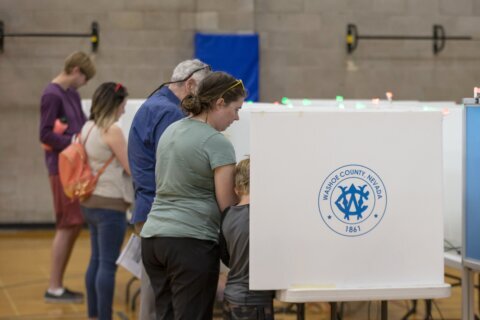
AP Decision Notes: What to expect in Nevada’s state primaries

AP Decision Notes: What to expect in South Carolina’s state primaries

AP Decision Notes: What to expect in Ohio’s special congressional election
Recommended.

New details in massive Arlington home explosion: Suspect had stockpiled gasoline, guns

Police ID 3 killed after being struck by train in Springfield

VP Harris campaigns to stop gun violence with Maryland Senate candidate Alsobrooks
Related categories:.
Election latest: Rishi Sunak heckled by GP at the end of 'torrid day'; Nigel Farage accused of 'bigotry' during debate
The latest updates from the general election campaign, as Rishi Sunak is heckled by a GP and Nigel Farage gets stuck in during a televised debate.
Saturday 8 June 2024 01:40, UK
- General Election 2024
Please use Chrome browser for a more accessible video player
Election news
- New poll reveals what public think about PM leaving D-Day events early
- 'The country is not stupid': Sunak laughs as GP heckles him
- Farage accused of 'bigotry' in TV debate
- Sunak apologises for D-Day decision and admits it was a 'mistake'
- PM says 'it's important we don't politicise this'
- Starmer says PM will 'have to answer for his own actions'
- Unite did not endorse Labour's election manifesto
- Electoral Dysfunction: What could be in the party manifestos?
- Live reporting by Brad Young
Expert analysis
- Rob Powell: It beggars belief someone didn't sound the alarm about PM leaving D-Day events early
- Tamara Cohen: Labour can't believe their luck
Election essentials
- Battle For No 10: PM and Starmer taking part in Sky News special
- Have your say: Be in the audience for our election leaders event
- Campaign Heritage: Memorable moments from elections gone by
- Trackers: Who's leading polls? | Is PM keeping promises?
- Follow Sky's politics podcasts: Electoral Dysfunction | Politics At Jack And Sam's
- Read more: Who is standing down? | Key seats to watch | How to register to vote | What counts as voter ID? | Check if your constituency is changing | Your essential guide to election lingo | Sky's election night plans
Snap findings from a More in Common poll of more than 1,000 viewers of last night's BBC debate suggest Nigel Farage came out on top.
According to the poll results , the audience is most likely to think Reform UK's leader won, with 25% picking him.
Labour's deputy leader Angela Rayner comes in second with 19%.
Just 7% thought Tory Penny Mordaunt won, but 32% believe she'd be a better prime minister than Rishi Sunak - with 12% picking him.
Full Results
- Nigel Farage - 25%
- Angela Rayner - 19%
- None of the above - 14%
- Carla Denyer - 11%
- Stephen Flynn - 10%
- Penny Mordaunt - 7%
- Daisy Cooper - 5%
- Rhun ap Iowerth - 2%
- Don’t know - 8%
Almost half (47%) of 2019 Tory voters watching the debate thought that Mr Farage won the debate, while Ms Rayner leads among 2019 Labour and Lib Dem voters who tuned in.
The poll also shows viewers are most likely to think the SNP's Stephen Flynn (net +31), the Green Party's Carla Denyer (net +31) and the Lib Dem's Daisy Cooper (+30) did well in the debate.
Reform's original candidate for Clacton will stand as an independent against Nigel Farage in the upcoming general election.
Anthony Mack quit Reform after he was replaced by Mr Farage earlier this week to vie for the seat in Essex.
But that hasn't stopped him from trying to win there.
Mr Mack is expected to hold a press conference later today.
Olympic athletes, top musicians and an ex-soap actor are among those standing to become members of parliament at the general election.
The deadline for candidates to submit their nominations passed earlier today.
Notable names on the list include:
- Blur drummer Dave Rowntree, Labour, Mid Sussex
- Double Olympic gold medal rower James Cracknell, Conservative, Colchester
- Rock star Tom Gray from the band Gomez, Labour, Brighton Pavilion
- Former Coronation Street actor Marc Anwar, independent, Bury North
- Gogglebox's Josh Tapper, Labour, Hertfordshire
- Olympian Marc Jenkins, Conservative, Gower
Count Binface has announced he will stand against Rishi Sunak in his Richmond and Northallerton constituency.
Speaking on his podcast, Trash Talk, Binface said it would be like "Fury vs Usyk times a billion" in the July 4 election.
"That's right, I am here right now in Richmond and Northallerton and I can announce that I will be taking on Prime Minister Rishi Sunak in electoral combat on July 4.
"You shirked D-Day Rishi, you can't miss the B-Day.
"That's right. Binface vs Sunak is going to be Fury vs Usyk times a billion. Bring it on."
Binface recently came 11th in the London Mayoral Elections, where he earned 24,260 votes.
It was reported last weekend that allies of Penny Mordaunt claimed Downing Street was keeping her "in a box" during the election campaign because Rishi Sunak's team see her as a threat.
Well, after her barnstorming performance in a TV debate against politicians from six opposition parties, the Leader of the Commons is well and truly out of her box now. And she mustn't be put back in it.
Her opening words in this 90-minute showdown were explosive. The prime minister, she declared, had been "completely wrong" to leave the D-day ceremonies in Normandy early. No pulling of punches there.
She said the PM was wrong, not once, not twice, but three times. No wonder Number 10 see her as a threat. If this was an audition for a leadership bid after the election, her friends will claim she passed with flying colours.
But once she'd dug her black stilettos out of the PM's back with her opening remarks, after that she was relentlessly on message in hammering Labour on its policies on tax, immigration and crime.
She was at her most combative on the Tories' controversial allegation – first made by Rishi Sunak in his TV debate with Sir Keir Starmer on Tuesday – that Labour is planning a £2,000 tax grab if it wins the election.
This attack triggered the most heated clash of the whole debate, when Mordaunt traded blows with Labour's Angela Rayner on tax. It was a shouting match that went on long after presenter Mishal Husain attempted – but failed - to stop them.
It was all the more heated because the pair were standing next to each other at the end of the row of seven leading politicians, including Nigel Farage, the Lib Dems' Daisy Cooper and the SNP's Westminster leader Stephen Flynn.
For the rest of the debate, Rayner was slightly subdued, rather like Sir Keir had been against the PM on Tuesday. Rayner didn't even attack Sunak about D-day at the start. Nor did Daisy Cooper. Like Sir Keir, his deputy needs to raise her game.
Besides Mordaunt, on D-day Farage claimed Sunak had been unpatriotic and Flynn accused the PM of putting his own political career before public service and Normandy war veterans. Strong stuff.
Mordaunt also tore into Rayner over her previous voting record against renewing Trident. And the brightness of Rayner's red dress wasn't matched by a bright performance in the debate, although she improved as the debate went on. Mordaunt, incidentally, wore Thatcher blue. Remind you of anyone?
Throughout the debate, Farage was typically impish. His quips included claiming Starmer was "very dull" and "Blair without the flair". The PM, he joked, was "slippery Sunak". Yes, he's used those jibes before, but the audience enjoyed them.
Stephen Flynn had his good moments, most notably when he condemned Brexit, an attack on the Conservatives and Labour that the audience enjoyed.
But this debate was about Penny Mordaunt. It was her show, despite the large cast list. If she has been kept in a box by Number 10 up to now, the PM's allies will have been delighted on her attacks on Angela Rayner and Labour's policies.
But they won't have appreciated her blunt – and completely unprompted criticism – of the prime minister over the big story of the day, his D-day snub.
It was a story about a blunder of the PM's own making. It wasn't a gaffe, or an accident. It was sheer bad planning, terrible political judgment, embarrassing and highly damaging to Sunak and the Tory election campaign.
That, apparently was, Penny Mordaunt's view. And she said so. Number 10 won't be happy. A threat? You bet.
Foreign Secretary Lord David Cameron has been the victim of a hoax video call and messages from someone claiming to be the former president of Ukraine.
The government said it was making the incident public to stave off any attempts to manipulate footage of Lord Cameron.
The Foreign Office said a "number of text messages were exchanged followed by a brief video call between the foreign secretary and someone purporting to be Petro Poroshenko, former president of Ukraine".
Mr Poroshenko served as Ukrainian president between 2014 and 2019, and has remained a prominent figure in the country since leaving office.
"Whilst the video call clearly appeared to be with Mr Poroshenko, following the conversation the foreign secretary became suspicious," the Foreign Office said, adding contact details for other people were requested by the caller.
"Whilst regretting his mistake, the foreign secretary thinks it important to call out this behaviour and increase efforts to counter the use of misinformation."
Politicians have received repeated warnings in recent months about the growing threat of misinformation and disinformation, especially as artificial intelligence technology improves.
The prime minister is not the only one whose feet are being held to the fire over D-Day 80th anniversary commemorations.
Northern Ireland's first minister has been criticised for not attending, with only the deputy going instead.
DUP leader Gavin Robinson said it had been an opportunity for Michelle O'Neill to act as a first minister for all.
"With men from across the island being remembered, I am disappointed that the deputy first minister was alone in Normandy and the other half of the joint office was absent.
"When we consider how so many from this island have only been able to openly remember their grandparents' war efforts in recent years, this was a missed opportunity for leadership and reconciliation."
He continued: "The first minister should recognise it was a mistake."
Mr Robinson also accused Rishi Sunak of undermining "the authenticity of the speech" he made at the British Normandy Memorial by departing early.
A spokesperson for the Executive Office said: "The Executive Office [TEO] receives many invitations and endeavours to attend as many events as possible.
"TEO is represented by the first minister, deputy first minister and junior ministers.
"This week, TEO was represented at events including the D-Day commemorations; business awards and the Your Time to Shine female leaders celebration event."
Crime is the last theme of the BBC's debate, with one audience member raising the issue of knife crime.
The Green Party's Carla Denyer says not all crime can be tackled by being "tough", explaining a generation of young people have grown up with services like youth centres closing.
Nigel Farage says "stop and search" must be done "in a very tough way".
"We are seeing a societal decline of law and order in this country," he says.
The Liberal Democrats' Daisy Cooper says the model of policing must be changed, with more community policing engaging with families and faith groups.
She says stop and search can be useful, but "suspicion-less" deployment of it has been used to target people.
Penny Mordaunt, the Conservatives Commons leader, says knife crime in London is "top of the list", but the host points out the West Midlands has a higher rate.
"We need more police and we need police who are embedded in communities," she says.
Labour's Angela Rayner says education and reversing cuts to neighbourhood policing is needed.
Rhun ap Iorwerth, of Plaid Cymru, says decision-making should be made closer to communities, calling for more devolution.
Stephen Flynn, of the Scottish National Party, says tackling poverty as a driver of crime is required, and those in poverty have been failed by the government.
The final 30 second concluding statements are under way. Angela Rayner goes first. "If you want change, vote Labour," she says, though it's as though she's memorising a script rather than talking with passion.
Carla Denyer, of the Greens, says Labour are offering more of the same and Labour has changed into the Tories. She got better as the debate went on. Iorwerth is lively and will have done his party some good here.
Penny Mordaunt is polished. "For a more secure future, vote Conservative," she says. She's been class here and shows why for the Tories, she's an underused asset. Daisy Cooper mentions sewage in rivers for the first time this evening. Why so late?
The last word goes to Nigel Farage, who says that unlike the others he doesn't need an autocue. He's right about that. He's been impish throughout, clearly enjoying himself. We'll see a lot more of him in this campaign. That's why he became party leader, of course!
We're staying with the BBC's seven-way political debate between senior figures in the UK's political parties.
"What matters to you more: Economic growth or successful climate policy?" asks an audience member.
Mr Farage says climate policies like net zero are unrealistic and unaffordable.
"Nigel is going to keep your fact-checkers busy for a little while. Farage has been misleading you... so much of what he said there is simply untrue," says the Greens' Carla Denyer.
She criticises Labour for dropping a £28bn green investment pledge earlier this year.
Labour's Angela Rayner says there will be investment including insulating homes and creating green jobs, but oil and gas will be part of the future.
The SNP's Stephen Flynn says Westminster is betraying future generations and his party maintains its commitment to net zero.
"We are facing an ecological emergency", and economic growth can come with tackling it, says the Liberal Democrats, calling for a national insulation scheme.
"Nothing is more important than protecting the environment that you will be living in in future," says Plaid Cymru's Rhun ap Iorwerth.
The Conservatives' Penny Mordaunt says moving to green policies too quickly will "destroy supply chains".
Be the first to get Breaking News
Install the Sky News app for free


IMAGES
VIDEO
COMMENTS
Student council is a group of students elected by their classmates to organize activities and address student concerns and interests. The structure of student council varies by school. Many high schools have a separate council for each grade level (freshman student council, sophomore student council, junior student council, senior student council).
10 Student Council Speech Samples. Randy Rothgarn December 25, 2023 Speeches. Running for a position on the Student Council is a commendable endeavor that requires courage, planning, and a clear vision. Student Council serves as the voice of the student body, advocating for changes, planning events, and representing student interests.
Knowing your audience will help you strike the right chord when you are writing your speech. 2. Write your speech. Be prepared and write down what you say. ... The best way to win a student council election is to talk to a lot of students at your school. Introduce yourself to any student you come by and tell them you're running for student ...
Timing and word count. Student Council Speeches are generally brief: around 1-4 minutes long which isn't a lot of time! That's between approximately 150 - 600 words at an average speaking rate of 150 words per minute. To be safe say your speech out loud as if you were delivering it for real and time it.
Use a strong, attention-grabbing opening. Discuss your qualifications briefly, then move on. Focus your speech on your passion and present a blueprint to achieve your goals. Close with a strong summary and call to vote for you.
Step 1: Start Early. If you want to be president of your class or high school some day, you need to start working towards that goal early. Plan to join student council your freshman year, but don't expect to be elected president. Freshman student council elections are usually a mess.
Persuasive Writing Examples Why You Should Vote for me in the Student Council Elections Good afternoon, my name is Natalie Hicks and I would like to explain why you should vote for me in the student council elections on May 1st. I have been attending this school since I was 5 years old so I care a lot about what happens here. I learned to read ...
If you follow these next ten steps and add a little of your flair, you're going to be a hot contender for that election spot. 01. Decide what position you want to run for (and why) Before you nominate yourself for student council, it's helpful to get clear on two important things: The position you want. Why you want it.
1. Begin your speech by introducing yourself and your message. Within the first handful of seconds, you want everyone listening to know who you are, what you're running for, and why. Give 1-2 details about why you're the right person for the position, and find a way to organically plant your slogan early on.
Elections for freshman student council typically happen at the beginning of the school year, in the fall. Elections for sophomore, junior, senior, and school-wide student councils typically happen near the end of the school year before summer vacation. ... She is also passionate about acting, writing, and photography. Get Free Guides to Boost ...
The Key Takeaway. Student council elections can be essential for school morale and leadership opportunities for elected students. However, you should help other students see beyond what is happening at their school. Use the student council elections to help them learn critical life skills to help them become more educated adults.
Some Top Tips for Writing your Manifesto: Be concise and use clear language. Avoid long, complicated words - you won't win awards for being clever and you might just alienate important voters. Set out your previous experience and how this will help you if you got elected. Set out your goals for your time in office and ensure they are realistic ...
Let's soar high, Hawks!". This example of a student council speech uses a structured approach to convey the candidate's motivations, qualifications, goals, and plans in a clear and engaging manner, effectively persuading classmates to lend their support. Free Download in Word Free Download in PDF.
Here are seven essential steps to successful campaigning in the student body election. 1. Lay the Groundwork Early. While it's certainly possible to come seemingly out of the blue and take an election by storm, that's more common on the big screen than it is in real life.
In a student council election, visibility is key. Utilize posters, social media, and word of mouth to get your message across. Be creative but respectful with your campaign materials, ensuring they stand out and convey your message effectively. This is where your creativity can shine.
Elections and voting: Assisting in organizing and overseeing Student Council elections, including the nomination processes and voting procedures. ... I highly recommend reading it before planning or writing your speech for Student Council Secretary. You'll find: a list of important points you'll want to consider carefully before you start,
The student council application process is crucial for selecting the most qualified and dedicated candidates to represent the student . It allows students to showcase their leadership skills, creativity, and commitment to serving their peers.The application typically includes questions about the candidate's academic achievements, extracurricular activities, and reasons for wanting to join the ...
As your friend, I will also be asking you for your ideas. A chain is only as strong as its weakest link. Together we must be strong and cooperate to achieve our goals. As your friend, I believe in you. I believe in this school. I believe in our ability to work together for something great.
Losing the student council elections of my sophomore year was detrimental to my involvement in student council for I believed there was no aspiration for me to participate anymore with losing the elections. Say no to plagiarism. ... Students who find writing to be a difficult task. If you fit this description, you can use our free essay samples ...
Town Council Case Study. Gean Chouinard seeks re-election to Town Council submitted Edson Councillor Gean Chouinard will be seeking his third term on Edson Town Council in his re-election campaign. Chouinard is married to his wife Karin and has two sons, Ryan, 16 and Darin 10. Chouinard has called Edson his home for the past 36 years.
Include something for everyone. Use clear language and grammar. Spell-check your manifesto before submitting! Be creative - you want to stand out, not blend in. Don't get carried away or waffle to fill space. It's about you and your relevant experience - not your opponents. Repeat your name and ask for their vote at the end.
500+ Words Essay on Election. Election is the process through which people can express their political opinion. They express this opinion by public voting to choose a political leader. Furthermore, this political leader would have authority and responsibility. Most noteworthy, Election is a formal group decision making the process.
As the nation wrestles with critical issues from the future of education to democracy itself, student voices have been left out of the conversation—until now. NASSP recently held its first election for the newly created National Student Council. The ten students elected to the Council will advocate on behalf of millions of their peers on federal policies that directly shape their educational ...
Student council is a curricular or extra-curricular activity for students within grade schools around the world. Present in most public and private K-12 school systems across the United States‚ Canada and Australia these bodies are alternatively entitled student council‚ student government‚ Associated Student Body‚ Student Activity Council‚ Student Council Association or S.C.A ...
That election saw 17,760 votes cast as it also featured a mayoral race and four council races. In the November 2018 bond election, Proposition E received the highest vote total with 98,609 votes. Odom-Wesley still voiced her preference for the three-year cycle. Another factor the council favored was the ability to pass a bond with a smaller ...
Studying & Taking Standardized Tests: 6 months-1.5 years. Typically, students will have completed the mathematics coursework needed to take the SAT and ACT by the spring of their sophomore year ...
ROANOKE, Va. (WDBJ) - Candidate Jamaal Jackson withdrew from the 2024 Roanoke City Council race Monday and now a city official is claiming Jackson violated state law.. According to Andrew Cochran ...
The primary is largely viewed as a de facto election in a city where the Democratic Party dominates political life. ... Two other members of D.C. Council whose seats aren't being contested this ...
The latest updates from the general election campaign, as Rishi Sunak's decision to leave D-Day commemorations early dominates headlines. The prime minister has said it is important that the ...
General Election campaigning is to take a back seat for a couple of days, as commemorations for the 80th anniversary of D-Day begin. Both Rishi Sunak and Sir Keir Starmer are due to attend a ...